Boris Johnson government reshuffle - February 2020
Boris Johnson is conducting a reshuffle of his government. Follow the latest developments and analysis from the team at the IfG.
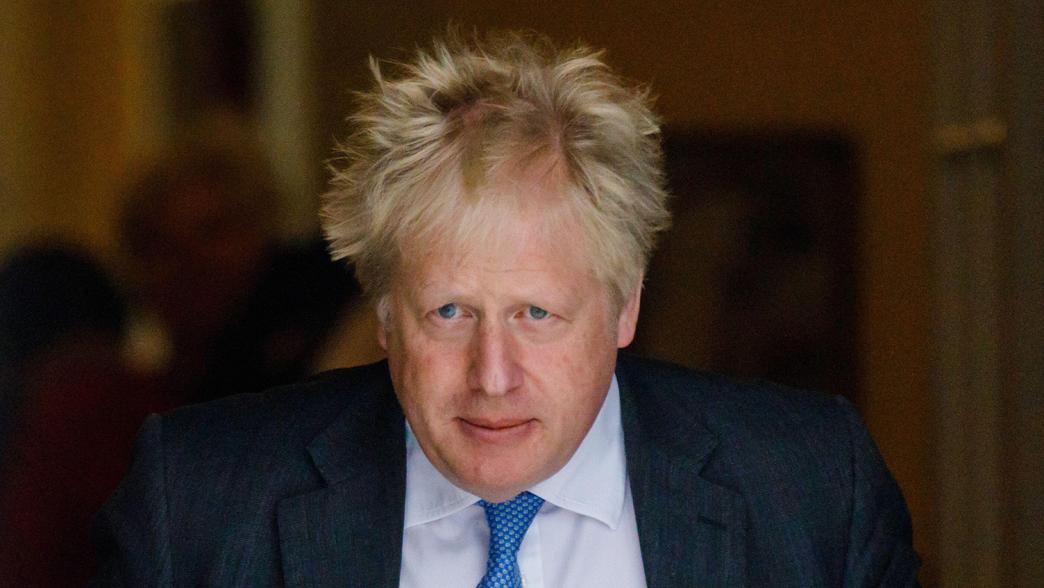
The government reshuffle, in 13 charts
19 February 2020, 15:19
It’s over. It’s done. We now know the full line-up of government ministers following Boris Johnson’s reshuffle – here it is:

Full details of their policy portfolios should emerge over the coming days and weeks. In the meantime, here are some of the key points.
Eight ministers that previously attended Cabinet have left the government…
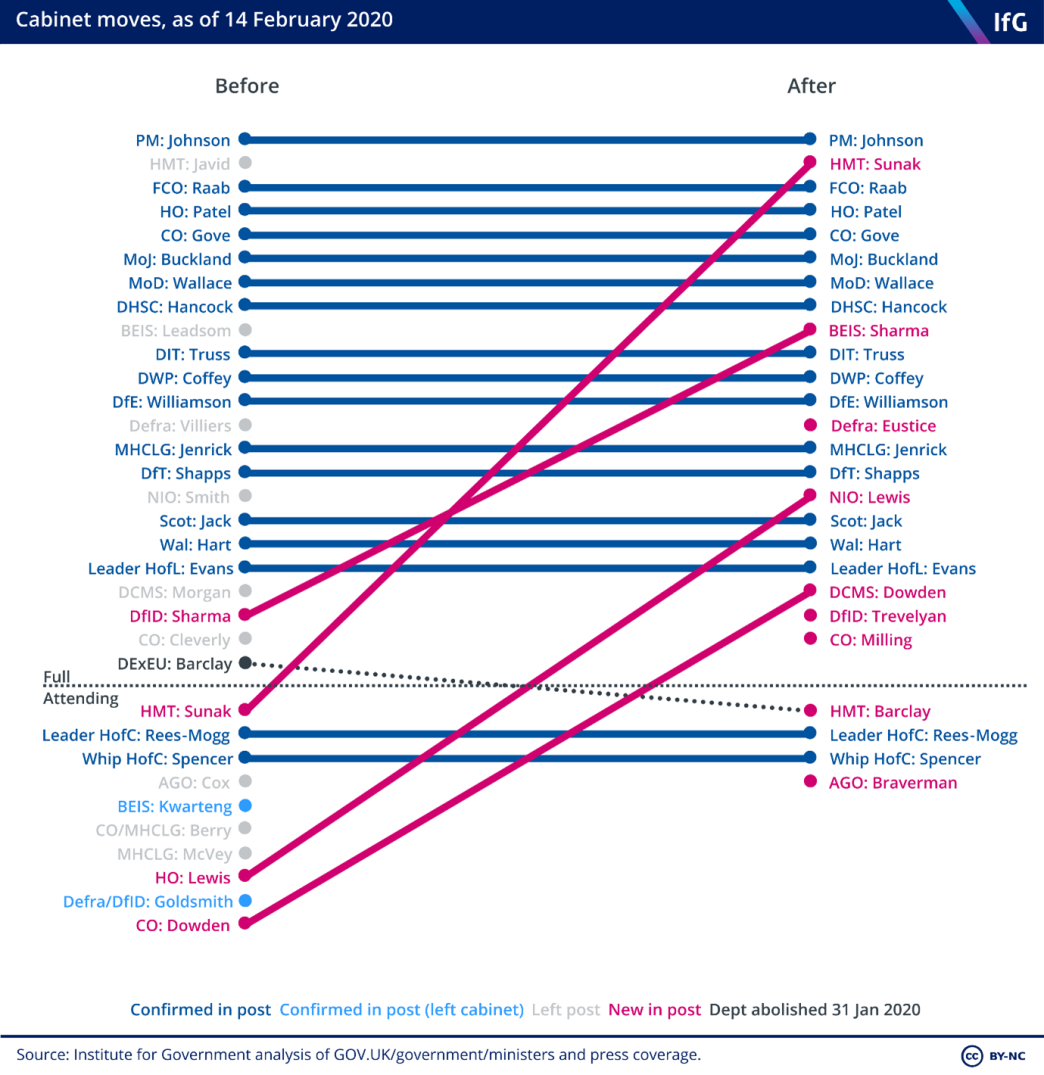
The departure of Chancellor Sajid Javid has understandably attracted most attention, coming as a surprise to many and making Javid the shortest-serving chancellor since Iain Macleod in 1970, without having delivered a Budget. Also gone are Northern Ireland secretary Julian Smith, business secretary Andrea Leadsom, environment secretary Theresa Villiers, culture secretary Baroness Morgan, attorney general (and ‘not a team player’) Geoffrey Cox, Northern Powerhouse minister Jake Berry and housing minister Esther McVey. McVey’s replacement as housing secretary, Chris Pincher, becomes the tenth person to hold that role since 2010.
New appointments are:
• Chancellor, Rishi Sunak, promoted from chief secretary to the Treasury
• Business secretary, Alok Sharma, previously international development secretary. He also becomes lead minister for the COP26 international climate change conference
• Environment secretary George Eustice, promoted from within the department (and one of the record number of ministerial resignations under Theresa May’s premiership)
• Northern Ireland secretary, Brandon Lewis, previously a Cabinet attendee as minister of state for security and deputy for EU Exit and No Deal preparation
• Culture secretary, Oliver Dowden, previously a Cabinet attendee as minister for the Cabinet Office (a role now absorbed by Michael Gove)
• International development secretary, Anne-Marie Trevelyan, completely new to Cabinet having been a junior minister at the Ministry of Defence
• Minister without portfolio (and Conservative party chair), Amanda Milling, previously a deputy chief whip
• Chief secretary to the Treasury, Steve Barclay, the secretary of state at the Department for Exiting the European Union (DExEU) until the department was abolished on 31 January 2020
• Attorney general, Suella Braverman, formerly a junior minister at DExEU until resigning in November 2018.
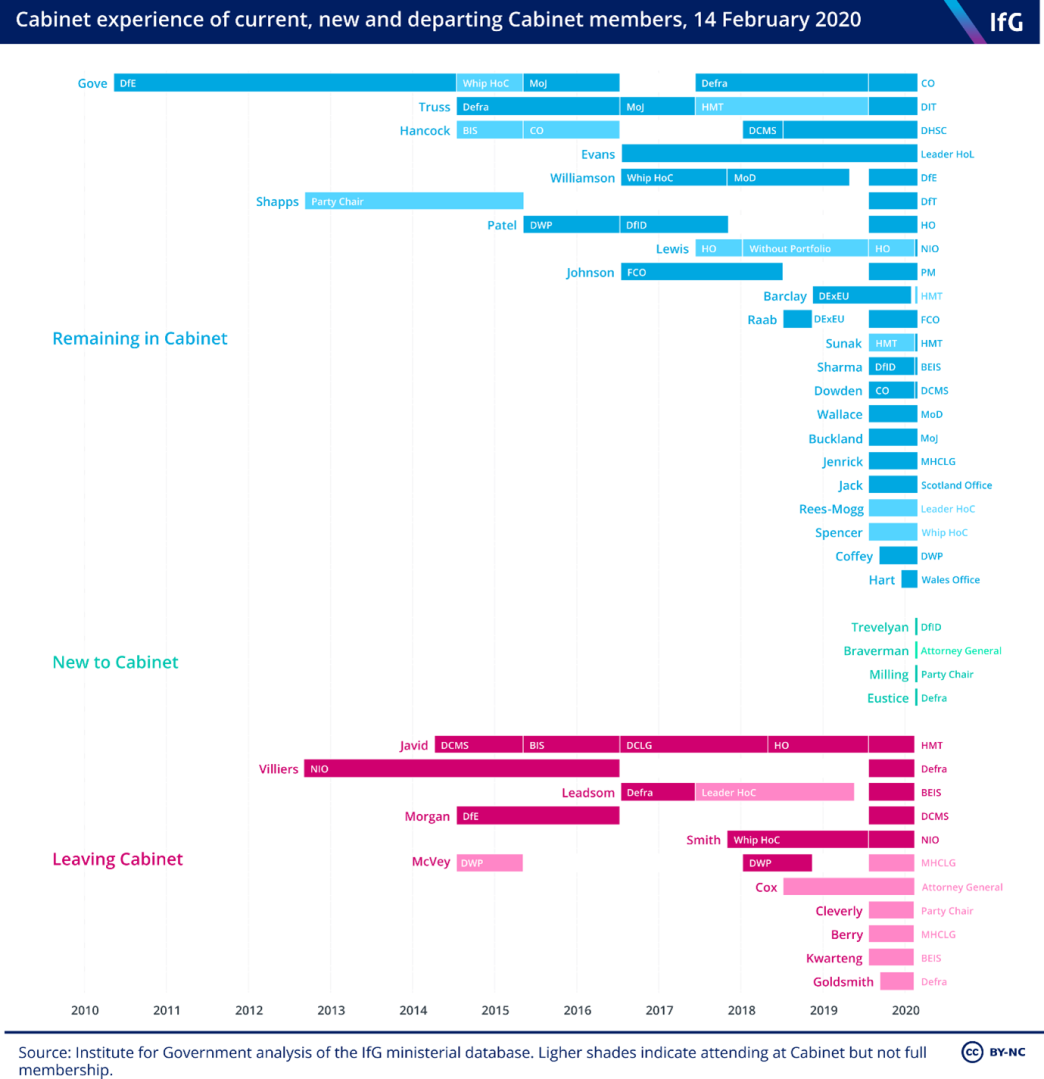
Only four Cabinet attendees are completely new to Cabinet. International trade secretary, Liz Truss, is now the longest continually serving member of the Cabinet.
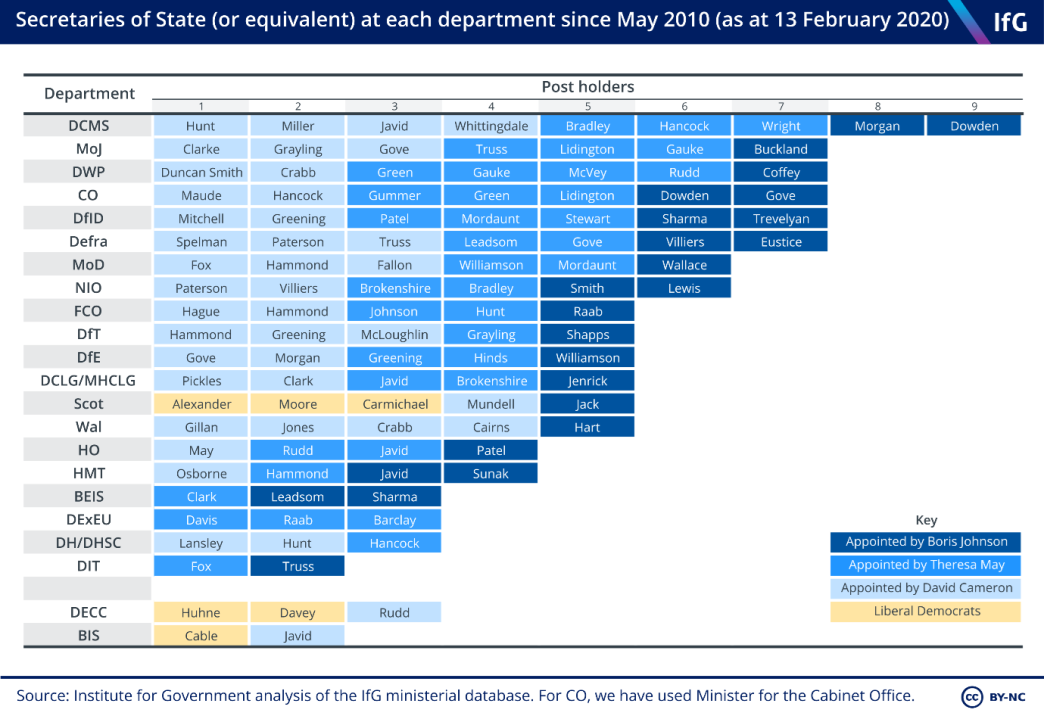
Oliver Dowden is the ninth secretary of state for culture, media and sport since 2010. Five departments – MoJ, DWP, the Cabinet Office, DfID and Defra – are on their seventh lead minister in that time. As we’ve often pointed out, excessive turnover of ministers can disrupt the business of government, as ministers adapt to new briefs and departments adjust to new personalities and priorities.
…and the Cabinet is the smallest it's been since Tony Blair’s premiership
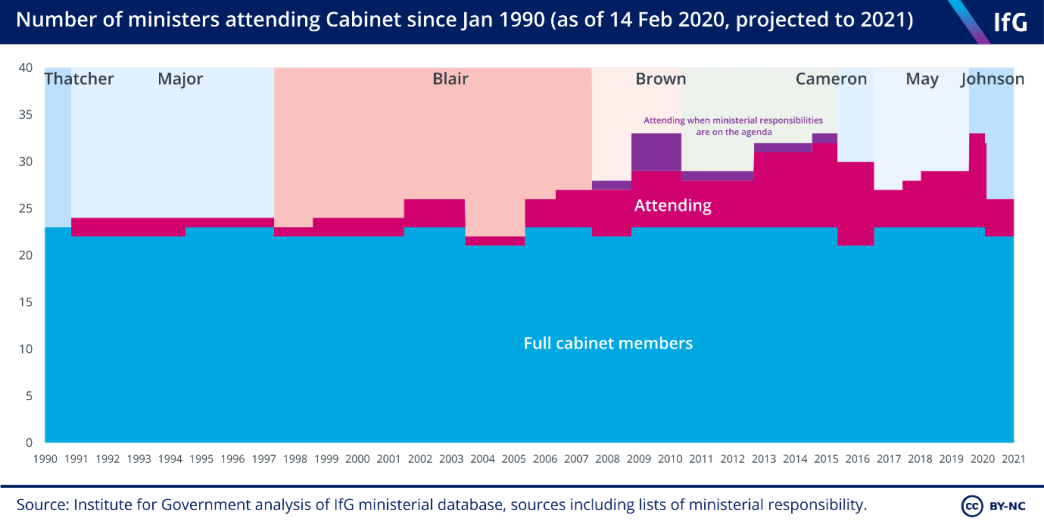
With 22 full members and four additional ministers attending, the Cabinet is now the smallest its been since the mid-2000s. Before the abolition of DExEU, 33 ministers had been attending Cabinet – the largest it has ever been. Dominic Cummings, the prime minister’s chief adviser, has previously argued that “The idea of a cabinet of over 30 people is a complete farce; it should be maximum of probably six or seven people.” This streamlining had already been reflected in the reduction in Cabinet committees (smaller groups of ministers able to take binding decisions), though we await details of any changes following this reshuffle.
The smaller Cabinet means there are three ministers – James Cleverly (former minister without portfolio, now at the Foreign Office/DfID), Lord Goldsmith (DfID/FCO/Defra) and Kwasi Kwarteng (energy and clean growth at BEIS) – who remain in government but no longer attend Cabinet.
Just under half of all ministers across government are new to their role
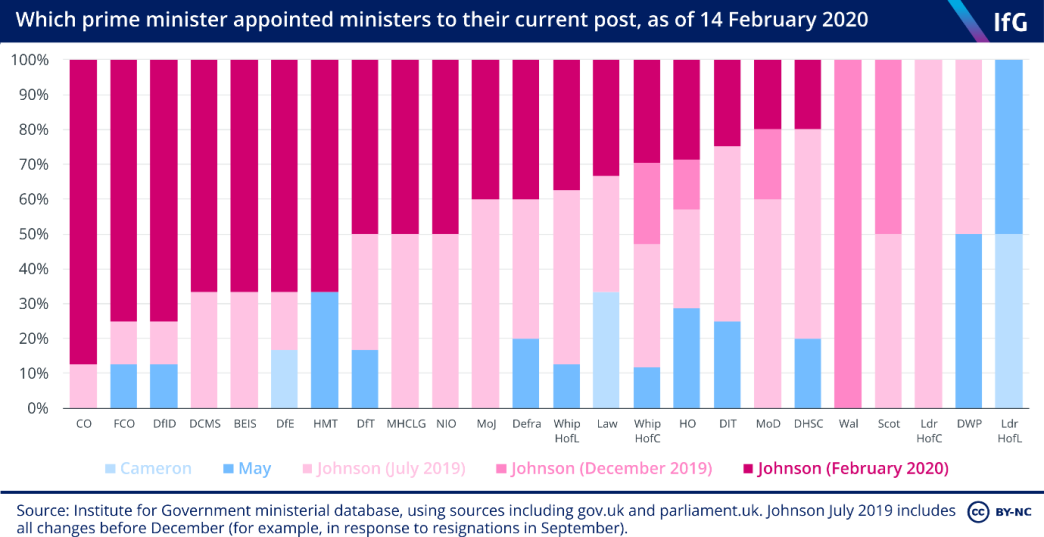
Around 45% of all ministers are new to their role in the February reshuffle – 85% of all ministers have been appointed to their current role by Boris Johnson since July 2019.
In ten departments, all ministers have been appointed by Boris Johnson since July 2019: Cabinet Office, DCMS, BEIS, MHCLG, the Northern Ireland Office, MoJ, MoD, office of the leader of the House of Commons, and the Scotland and Wales Offices. At the Cabinet Office, Foreign Office, DfID, BEIS, DfE and the Treasury, two thirds or more of all ministers are new as of this February reshuffle. At the Department for Transport, half of all ministers are new, with three ministers having left government altogether.
Some ministers taking on new roles at least have experience in their departments. In the Cabinet Office, two of the remaining ministers – Michael Gove and Chloe Smith – have taken on new responsibilities, and new environment secretary George Eustice has been promoted within the department.
Four former secretaries of state have returned to government – as junior ministers
One of the interesting features of this reshuffle has been the return of no less than four former secretaries of state to more junior ministerial roles. James Brokenshire has returned to the Home Office, a department he worked in for six years before Theresa May promoted him to the cabinet. John Whittingdale is back at DCMS, in a junior role at the department he used to head. Penny Mordaunt, having been in charge of DfID and the MoD, is now a junior Cabinet Office minister. And Steve Barclay, who left government when DExEU was shut down, has returned as chief secretary to the Treasury, filling the vacancy left by the new chancellor Rishi Sunak. As well as former cabinet ministers, Greg Hands is also back in government, taking on the DIT job which he held before resigning over Heathrow expansion.
It will be interesting to see how these experienced ministers find returning to government. For those who have previously been in charge of departments, it will be an adjustment returning to a more junior position, where they have less power and less sway over the machine than they had in previous roles. But their understanding of their departments and policy areas will mean they will need less time to get up to speed with both the structures and the issues they are dealing with. Brokenshire is perhaps the most experienced of the returnees, having held various Home Office roles during his time there, and at one point overseeing ‘two thirds of the department’. Whittingdale also knows the DCMS brief very well, having chaired the select committee before being appointed secretary of state. Barclay too has experience of the department he is joining – his first ministerial role was in the Treasury. But as chief secretary, he’ll be taking on a more senior role than his previous one in the department, overseeing the 2020 spending review – delayed from last year – which will set departments’ budgets for the next few years.
Reappointing former ministers helps ensure that there are experienced decision-makers across government. The question will be whether these returnees, having previously been in charge, are happy to stick it out at a lower rung on the ministerial ladder.
There weren't any machinery of government changes - this time...
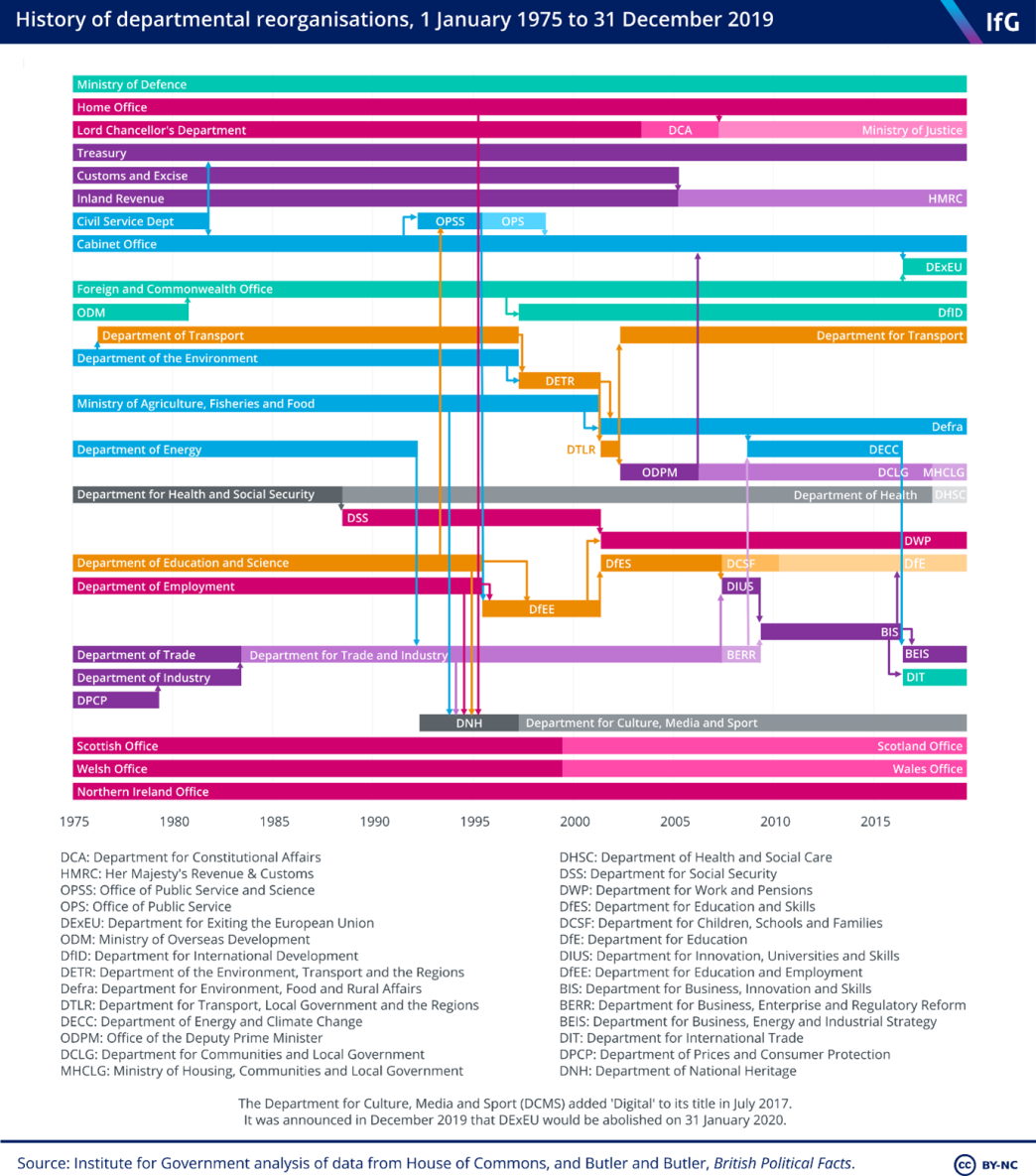
Despite lots of speculation before the reshuffle, no changes have been made to the departmental landscape. Previous Institute research has found that these changes can be very disruptive and, if not thought through, can fail to achieve their objectives. So holding off probably makes sense, although it seems that the current arrangements may not be permanent…
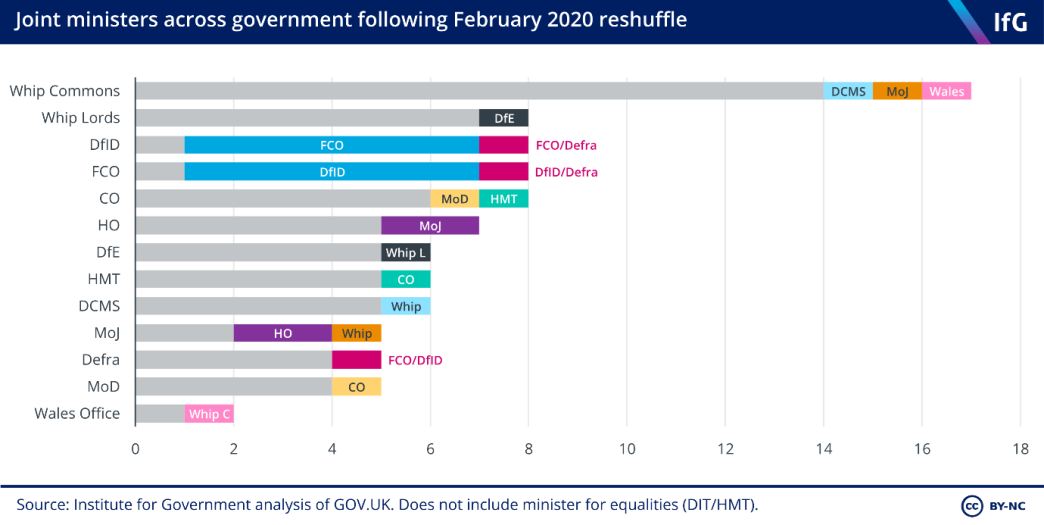
One of the big stories of the reshuffle is the fact that the Foreign Office and the Department for International Development now share an entire ministerial team. This has been seen by some as a prelude to a potential merger of the two departments down the line.
But there are also more joint ministers in government than at any time since David Cameron – 15 (or 16 including Kemi Badenoch’s equalities role). These jobs can allow ministers to break down any divides that exist between different parts of government. As a minister Jo Swinson was responsible for equalities policy, an area shared between BEIS and DCMS. She said that double-hatting helped “in preventing the silo mentality”.
However, other ministers working across two departments have found that it adds to the difficulty of the job. Damian Green, who worked as a junior minister in both the Home Office and Ministry of Justice during the coalition, said that “most of all you are trying to work to two bosses who may well have two different agendas, and indeed there is an inherent tension between the home secretary and the justice secretary whoever it is.” His successors as joint Home Office-MoJ ministers, Kit Malthouse and Chris Philp, may find they experience the same tension.
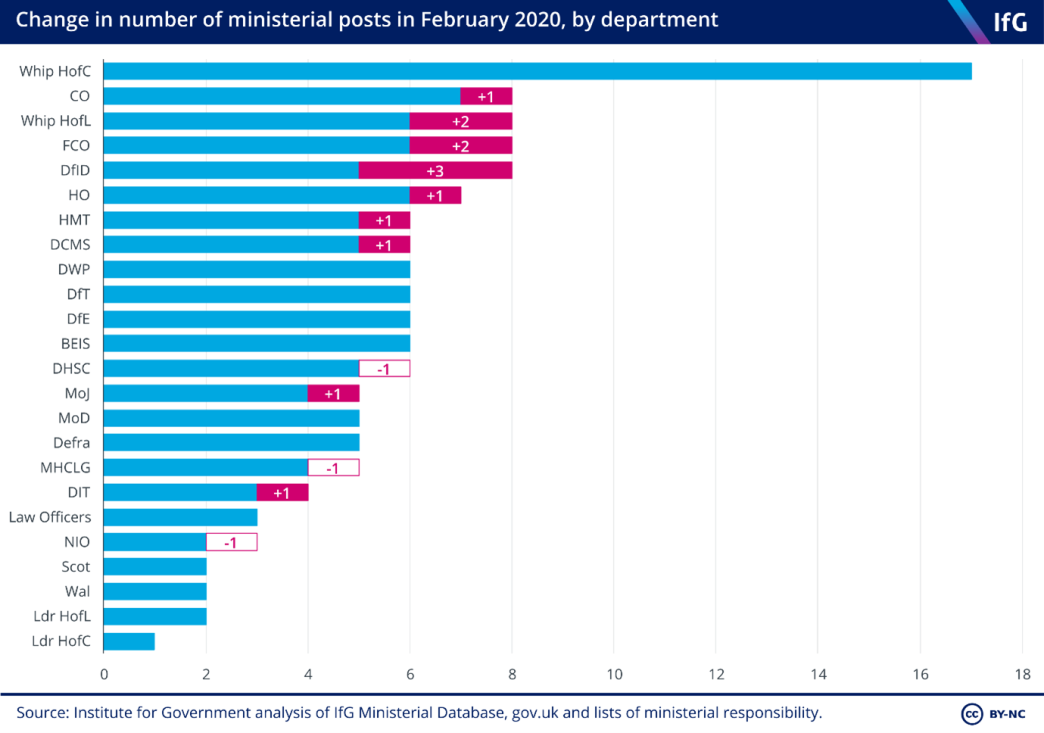
The double-hatting across foreign policy departments means DfID has three more ministers than before and the Foreign Office two. DCMS – often mooted for machinery changes at reshuffle time – actually gains a minister, as does the DIT (similarly subject to rumours this time round), while MHCLG, DHSC and the Northern Ireland Office each lose one.
Gender balance has increased slightly
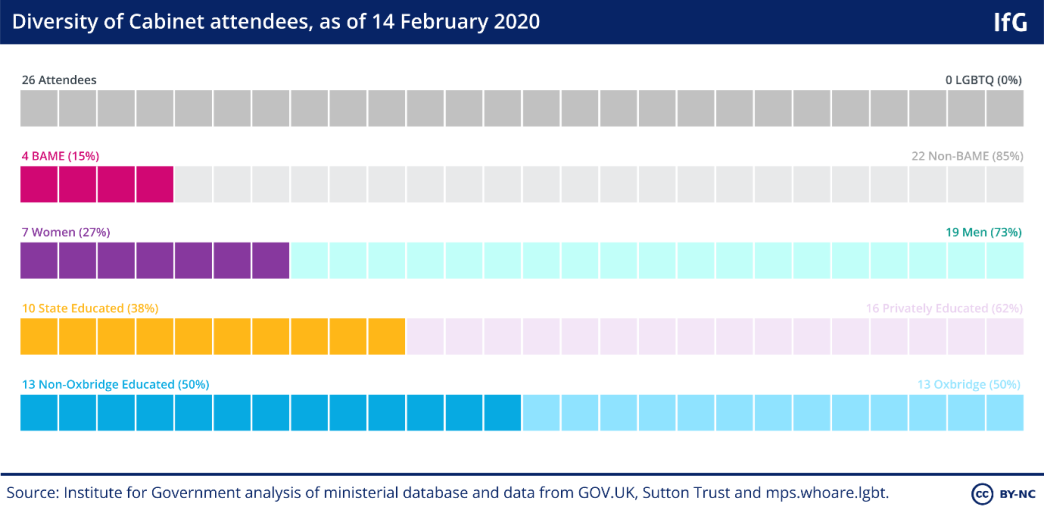
Men and the privately educated predominate in Cabinet. There are fewer minority ethnic Cabinet attendees following the departures of Sajid Javid, James Cleverly (now a minister at DfID and the FCO but not attending Cabinet) and Kwasi Kwarteng (still in the same role at BEIS but no longer attending Cabinet), but it is still the second-most ethnically diverse Cabinet in British political history.
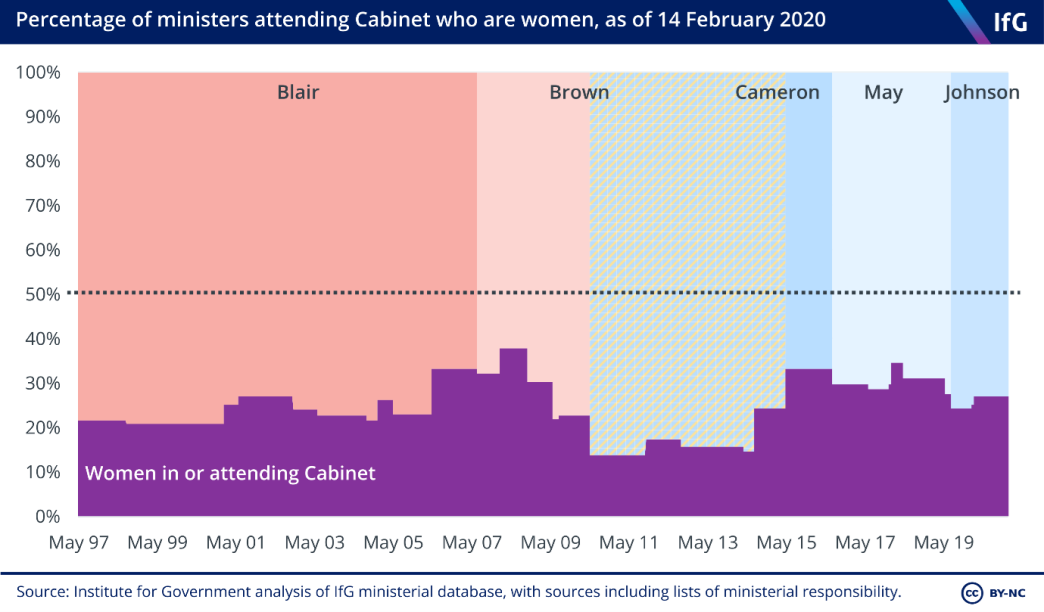
At Cabinet level, the gender balance is slightly better than it was - 27% of all Cabinet attendees are women, up slightly from 24% after Boris Johnson appointed his first government in July 2019. But this is still less than at some points under all other recent prime ministers, back to Tony Blair.
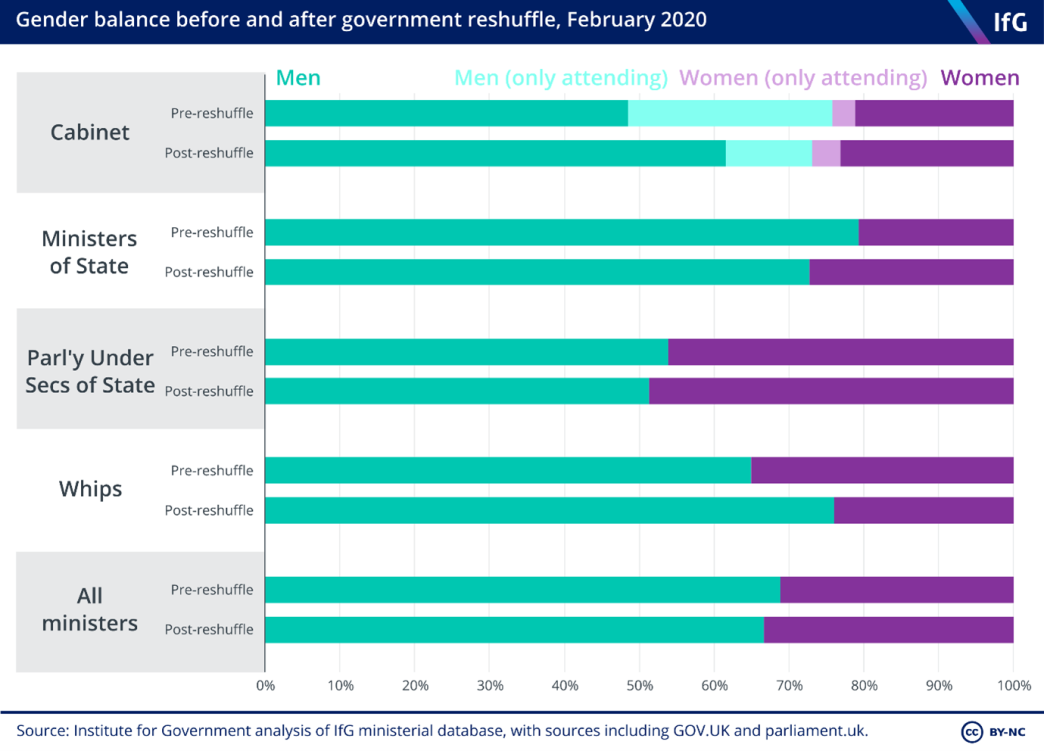
Gender balance has increased slightly across government as a whole – driven mainly by slightly more women at minister of state level (up to around a quarter) and parliamentary under secretary of state (just under half). This pipeline may yet lead to more women in Cabinet in the future.
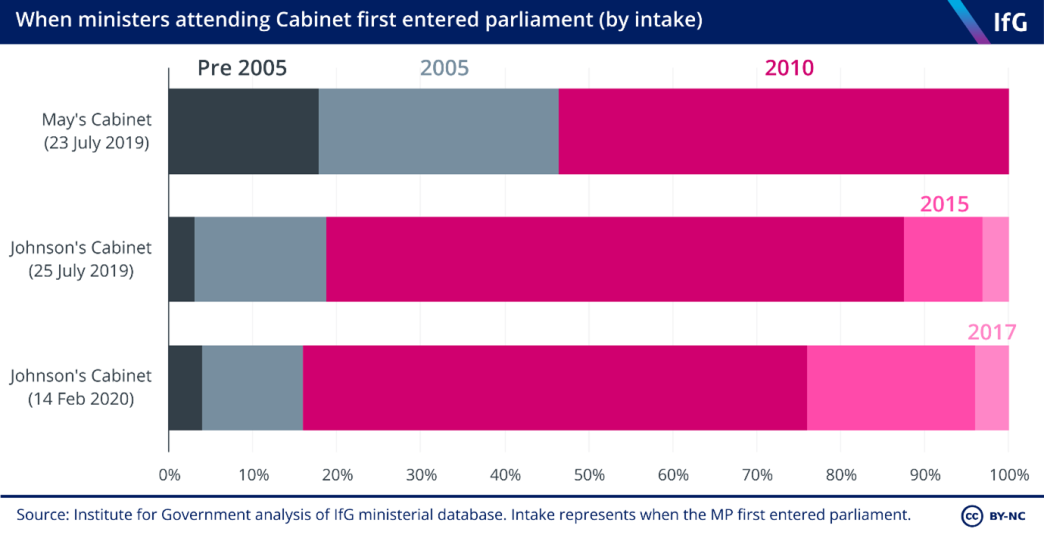
Alister Jack remains the only member of the 2017 intake in the Cabinet, with the 2010 and 2015 intakes accounting for most Cabinet positions. Of the 10 MPs entering government for the first time, five are from the 2015 intake and five are from the 2017 intake.
End of day two
14 February 2020, 18:34
We've kept blogging light today, as the prime minister continues to appoint junior ministers. We'll be back early next week with a full summary.
Until then, here's a quick summary of Cabinet level moves.
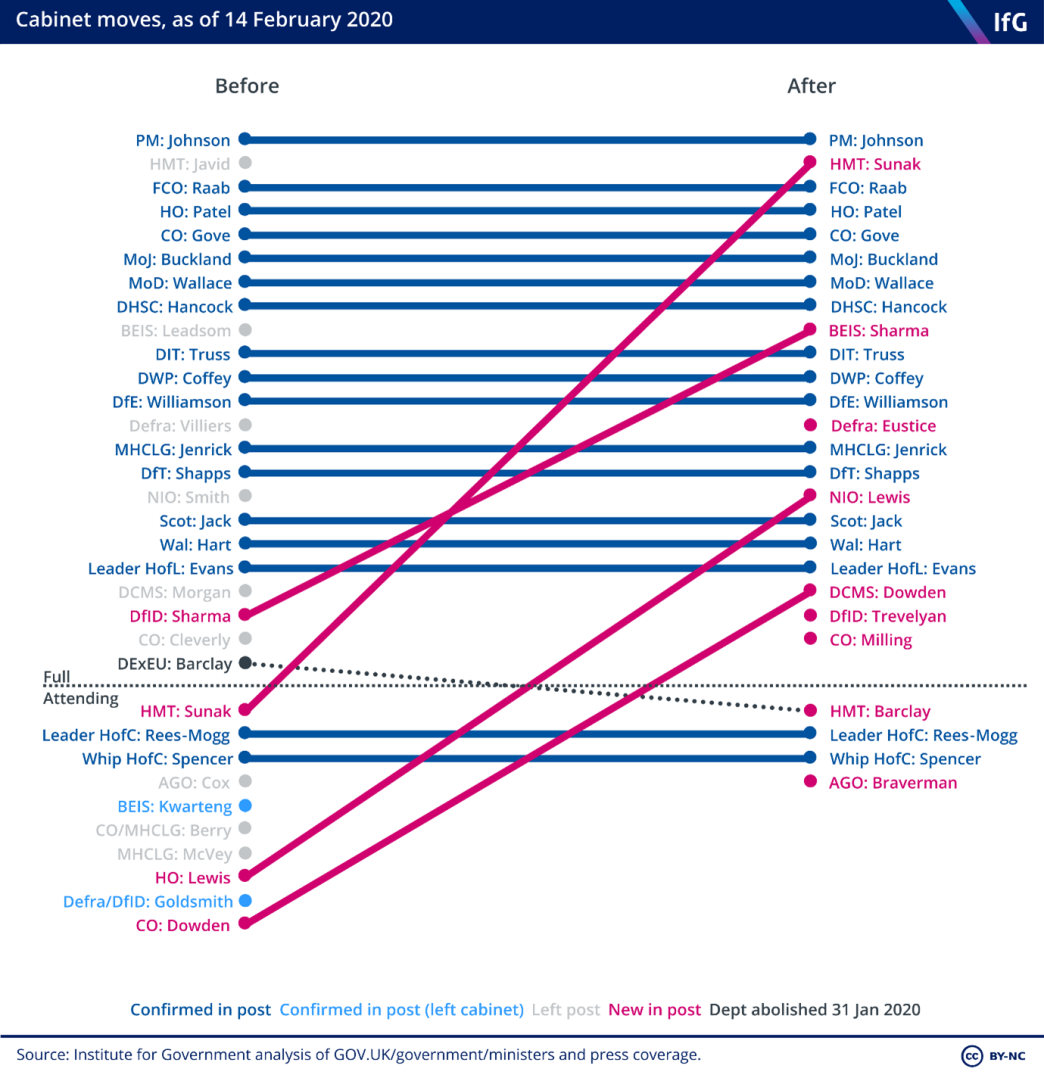
This is the new Cabinet. One of the most noticeable changes is its size.
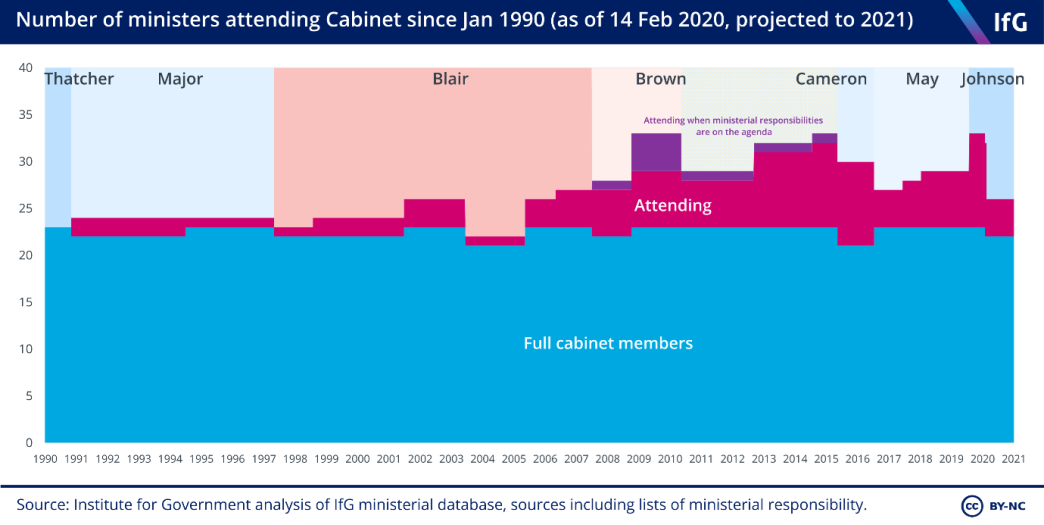
Before the Department for Exiting the European Union was abolished on 31 January 2020, the Cabinet (including all ministers allowed to attend) of 33 ministers was as large as it's ever been. Now, it's down to 26, the smallest since Tony Blair was prime minister. Dominic Cummings, chief adviser to the current PM, has previously argued that a Cabinet with more than 30 ministers is too large to make decisions.
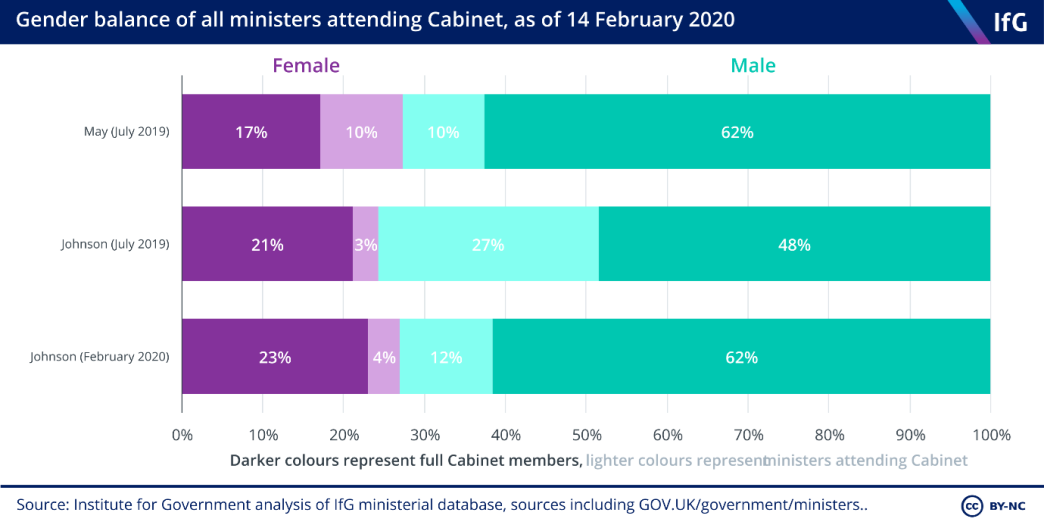
The gender balance is slightly better than it was - 27% of all Cabinet attendees are women, up slightly from 24% after Boris Johnson appointed his first government in July 2019.
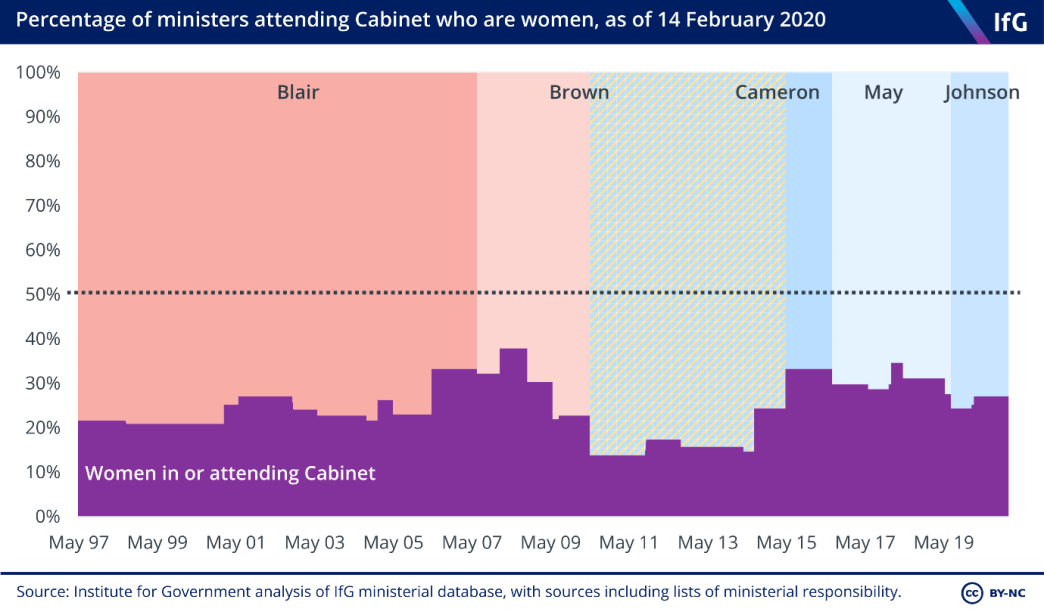
But this is still less than at some points under all other recent prime ministers, back to Tony Blair.
What does the cabinet look like now?
The full cabinet has now been appointed. There is one fewer cabinet minister, given the abolition of DExEU at the end of January, although Steve Barclay will still be in cabinet meetings as the new chief secretary to the Treasury.
There are also fewer ministers ‘attending’ cabinet without having full cabinet posts. Under David Cameron and Theresa May, there were many of these ministers attending – but Boris Johnson has now reduced that to just four roles. Two of those who previously attended cabinet – Kwasi Kwarteng at BEIS and Lord Goldsmith at DfID, Defra and the FCO – are still ministers but no longer attend cabinet.
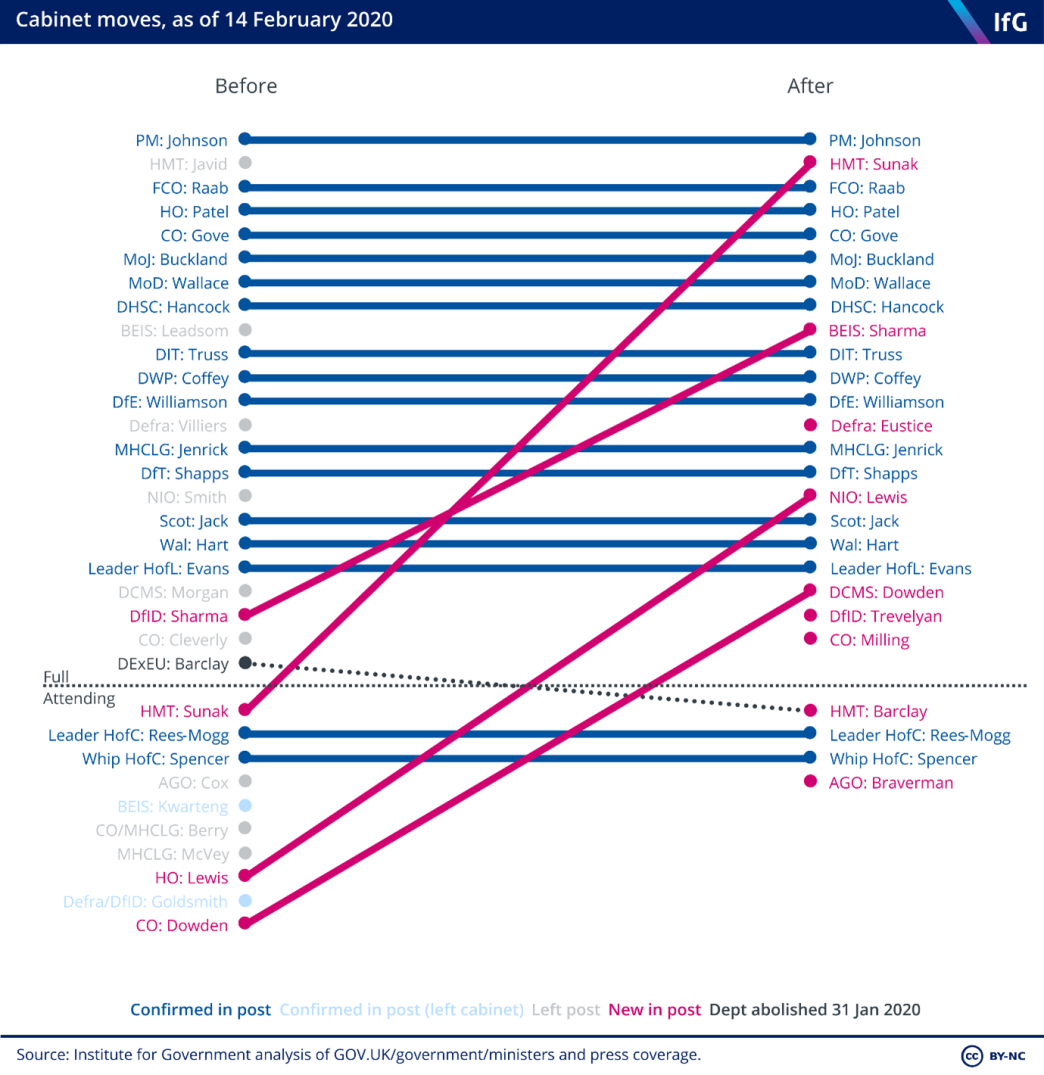
And much of the cabinet already has experience of sitting around the table. Only three full members – Anne-Marie Trevelyan, Amanda Milling and George Eustice – and Suella Braverman, the new attorney general who attends cabinet, have not been around the table before.
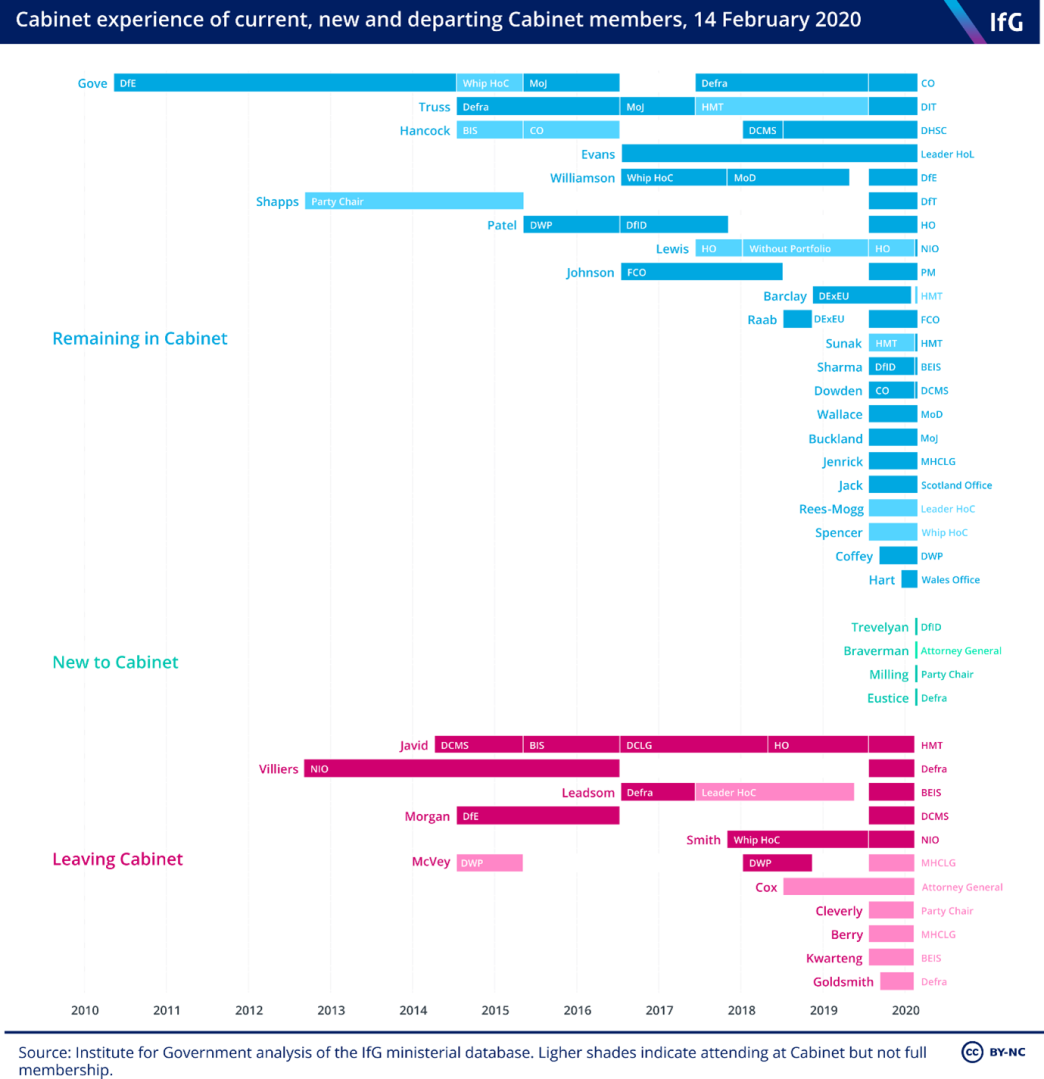
IfG reshuffle analysis
14 February 2020, 11:13
Here's our programme director, Alex Thomas (not an MP, despite Channel 4's best efforts), talking about the benefits of a bit of tension between Number 10 and the Treasury, after Sajid Javid's surprise resignation as chancellor.
And for more detailed discussion, check out our podcast, Inside Briefing. On yesterday's episode we were joined by Gavin Barwell, former chief of staff to Theresa May, to reflect on his experience of reshuffles.
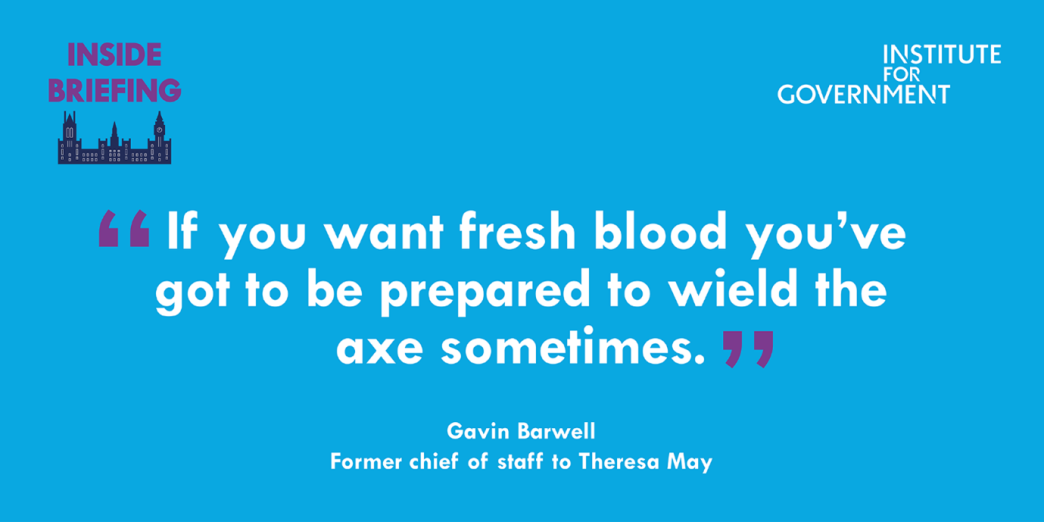
Ministerial experience
14 February 2020, 11:00
One of the interesting stories of this reshuffle is the return of former cabinet ministers to more junior roles. James Brokenshire has served as Northern Ireland and communities secretary has become a minister of state at the Home Office and Penny Mordaunt, former defence and international development secretary, has become paymaster general, a Cabinet Office role.
James Brokenshire was previously a junior minister at the Home Office and told the Institute about the benefit of staying in one department for a long time. His six years in the department meant that at times he knew more than his officials:
"a civil servant would sort of suggest to you a particular course of action and you’re saying, “well, we did try that a few years ago and it didn’t work.”
Turnover in civil service roles is undoubtedly a problem for government. But ministers also benefit from staying in their job for more than a few months. A recent Institute report argued that after this reshuffle the prime minister should keep his team in place for the long term:
The length of time a UK secretary of state stays in the job is now closer to that of a football manager than a CEO in the private sector, and almost a year shorter than the equivalent in Germany. Longer tenures would provide continuity and give the government the best chance of delivering on its most ambitious promises such as ‘levelling up’ the country.
Joint ministers
14 February 2020, 10:04
Good morning and welcome to Day 2 of our reshuffle live blog. While we wait for further junior ministerial appointments today, it’s worth looking at how many joint ministers have been appointed – working across two or more departments.
All of the junior ministers at DfID are also now joint ministers at the FCO – before this week, there were two joint FCO-DfID ministers, and one DFID-Defra minister: Lord Goldsmith, who is now minister in three departments, DfID, Defra and the FCO.
Cath has some thoughts on what this means for the relationship between the Foreign Office and DfID – her tweet thread starts here.
Former ministers told us how being a joint minister has its pros and cons. Nick Boles said that he “did absolutely make maximum use of the freedom of manoeuvre that the joint appointment gave me” but that joint appointments “can become a huge waste of time”. And Richard Harrington, who as minister for Syrian refugees worked across three departments (Home Office, DfID and DCLG), said that it was important to get all the departments working together: “I quickly gained a good rapport with the civil servants from the three departments and we set up one group, it was really like an independent group of civil servants”.
And it’s worth remembering that the FCO and DfID already work very closely together, and have indeed been one organisation in the past:
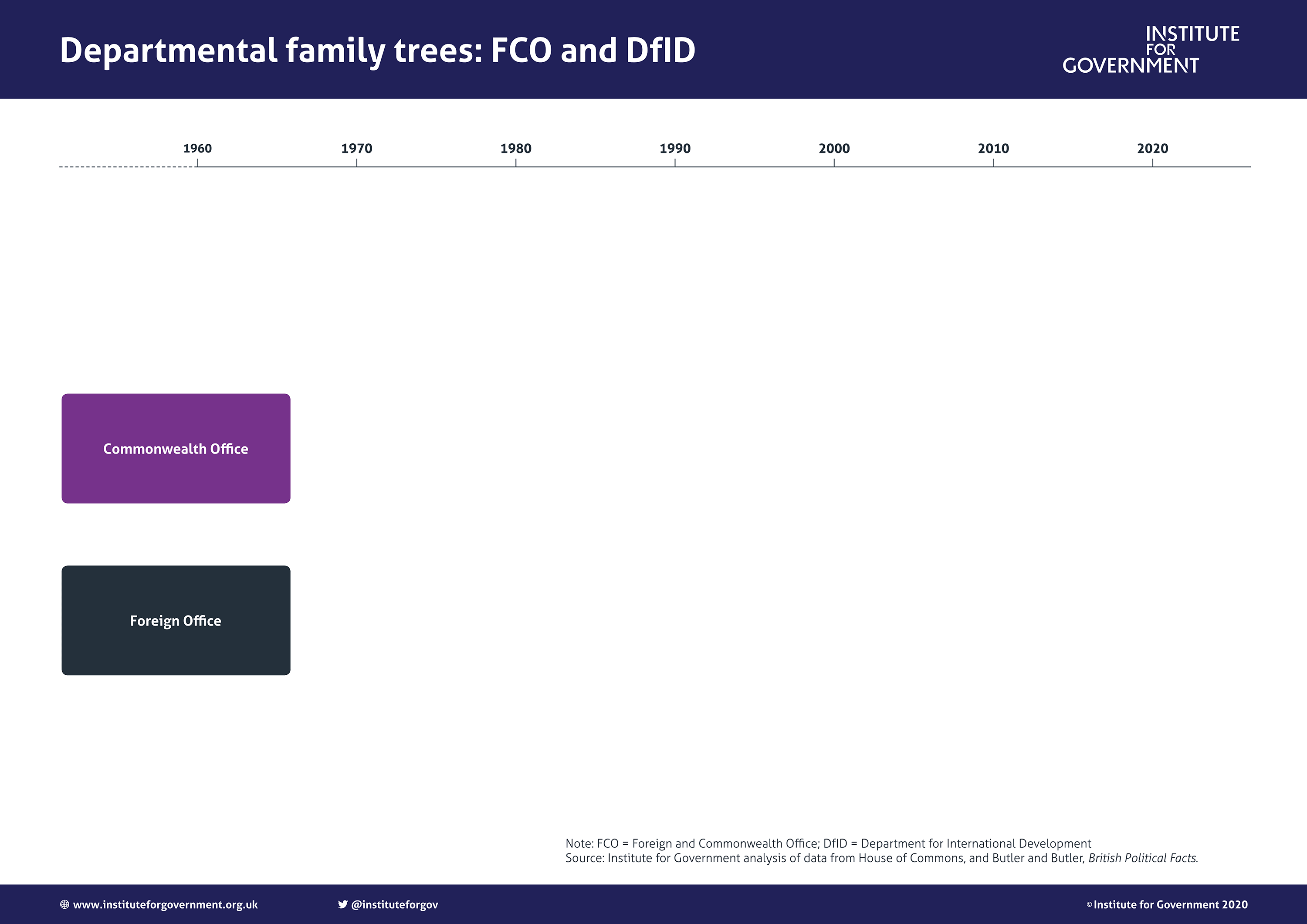
End of Day One
13 February 2020, 18:50
There’s a chance that may be it for today, so we’ll wrap things up, for now.
Here are the Cabinet moves we’re aware of:
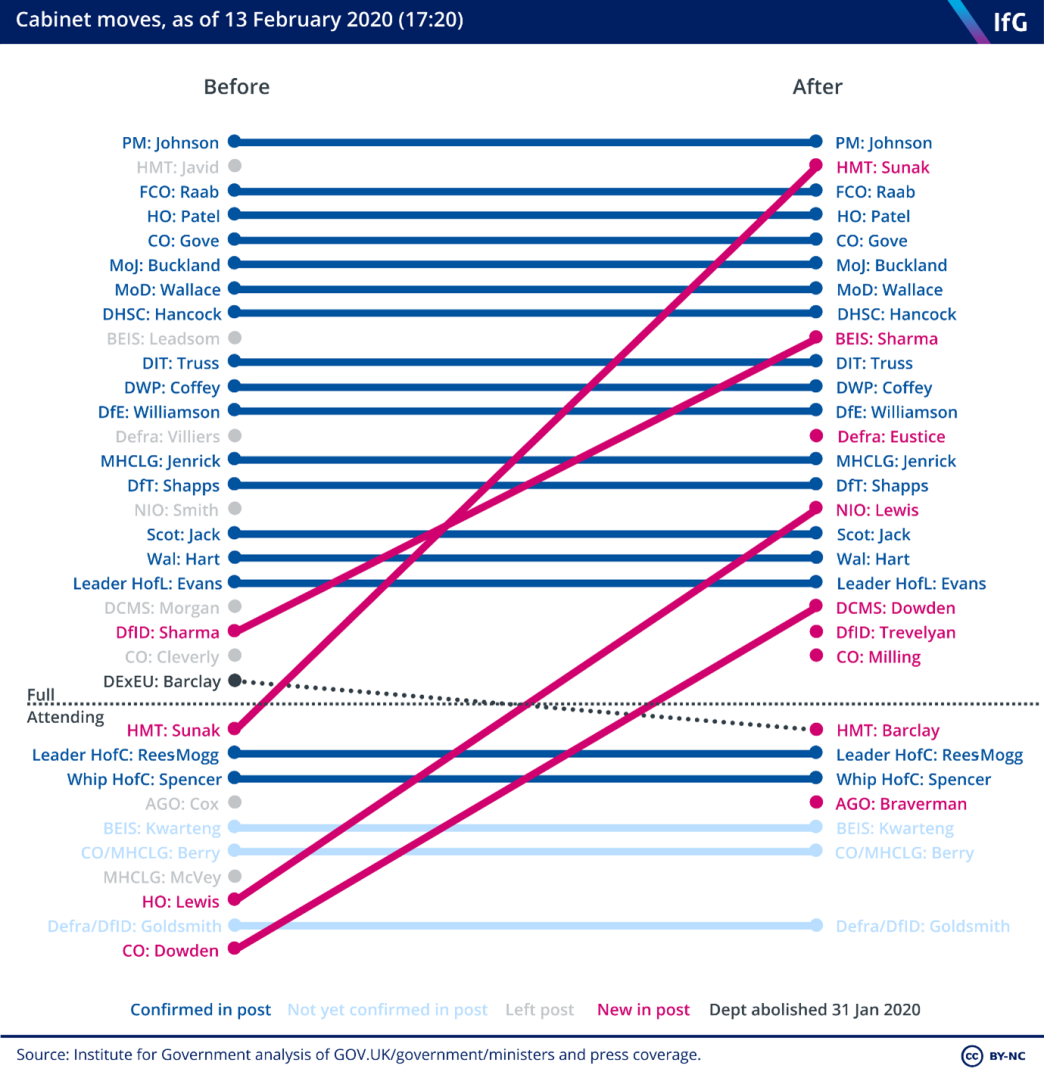
The biggest story of the day is the departure of chancellor, Sajid Javid. He’s replaced by chief secretary to the Treasury, Rishi Sunak.
Andrea Leadsom (BEIS), Theresa Villiers (Defra), Baroness Morgan (DCMS), Julian Smith (Northern Ireland), Geoffrey Cox (attorney general) and Esther McVey (housing minister, MHCLG) all lost their jobs as full members of or ministers attending Cabinet.
As well as Sunak, there were promotions/moves for Oliver Dowden (from Cabinet Office to DCMS – his minister for the Cabinet Office role is picked up by Michael Gove), Alok Sharma (from DfID to BEIS, and responsibility for the COP26 climate change conference), and Brandon Lewis (from attending as a Home Office minister to Northern Ireland secretary). Steve Barclay – who left Cabinet when DExEU was abolished – returns as chief secretary in place of the promoted Sunak.
George Eustice and Anne-Marie Trevelyan become Cabinet members for the first time – Eustice is promoted from within Defra to become secretary of state, Trevelyan from MoD to become international development secretary. Amanda Milling moves from chief whip into Cabinet, as minister without portfolio and Conservative Party chair. Suella Braverman attends Cabinet as the second-ever female attorney general.
All other full Cabinet members remain in place, except James Cleverly, who joins the Foreign Office and DfID. I’m assuming he’s no longer attending Cabinet but it’s not completely clear – and the same goes for other junior ministers attending Cabinet, Kwasi Kwarteng (BEIS), Jake Berry (CO/MHCLG) and Zac Goldsmith (Defra/DfID).
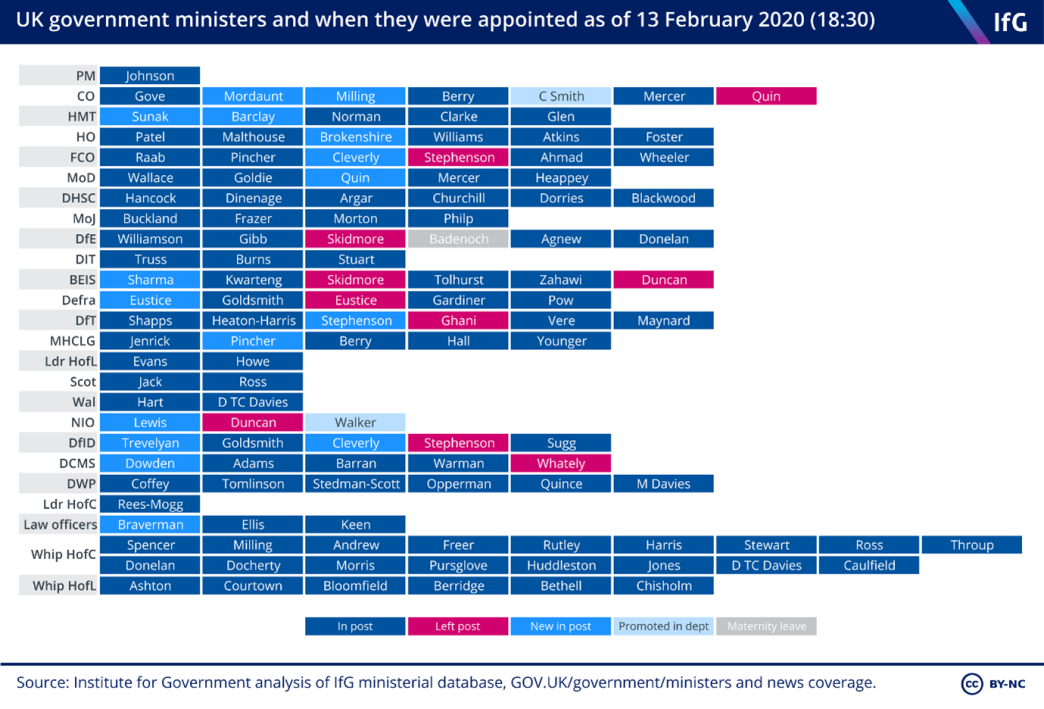
We know of some changes at more junior levels. Universities minister Chris Skidmore has left government, as have transport ministers Nusrat Ghani and George Freeman. Andrew Murrison left the FCO/DfID role now taken by James Cleverly. Lord Duncan has apparently left his roles at BEIS and the Northern Ireland Office.
From a list published on GOV.UK, we assume:
• Former Cabinet minister Penny Mordaunt returns to government as Paymaster General (a Cabinet Office role that had been held by Oliver Dowden)
• Christopher Pincher moves from the Foreign Office to MHCLG (as housing minister in place of McVey?)
• Andrew Stephenson leaves the FCO and DfID to fill one of the vacant roles at Transport
• Former Cabinet minister James Brokenshire returns to government to fill the role at the Home Office left by Brandon Lewis
• Jeremy Quin leaves Cabinet Office to fill Trevelyan’s position at the Ministry of Defence
• Helen Whately moves from DCMS to become a minister of state at the Department of Health and Social Care
• Chloe Smith and Robin Walker remain at Cabinet Office and the Northern Ireland Office respectively, but in more senior roles.
We think.
As the junior appointments start to come in, it’s worth reading Tim’s advice here. You can catch up on all the main developments by scrolling back through the live blog or looking through Twitter here.
SpAd blood
13 February 2020, 18:11
It’s not only ministers who are worried about keeping their jobs during a reshuffle. Their special advisers, or SpAds – temporary civil servants who provide political support to ministers – will be too.
Usually, that’s because of the ministers they work for moving or leaving, but this time round there may be other factors at work.
Reports say the prime minister’s chief adviser, Dominic Cummings, remarked at the end of last week’s SpAd meeting that he would “see half of you next week”.
SpAds are often maligned as Machiavellian manipulators, but they perform important roles – and there is a need to re-examine the need for more political appointments, as Alex wrote a few weeks ago.
And as Alex’s new comment piece argues, there may be some benefits to events at 11 Downing Street today:
"The appointment of a new chancellor and instruction for No.10 and Treasury special advisers (SpAds) to work as a single team will play to the PM’s advantage. The new join-up will cause some confected outrage among commentators and perhaps even Treasury officials, but it is not a bad thing in itself – No.10 and Treasury SpAds need to work closely together."
(There are risks too – you’ll need to read the piece.)
Either way, as with turnover of ministers and civil servants, excessive SpAd turnover can disrupt the business of government. Even before the reshuffle, we found there’d been a lot – this from Whitehall Monitor 2020:
Sixty-three SpAds who were in post in December 2018 had left government by December 2019, more than between any of the other annual data releases since 2010 – including the departure of all Liberal Democrat SpAds in 2015 and the transition from Cameron to May in 2016. Only 14 stayed in the same post (fewer than at any other point since 2010) and 21 moved between departments.
More than half (58, or 53%) of the current total are new to government, while 16 are returning to government after some time away. This number includes Dominic Cummings, the prime minister’s chief adviser, who was a SpAd at the Department for Education (DfE) between 2011 and 2013. There are also more SpAds – 109 – than at any point since at least 2010.
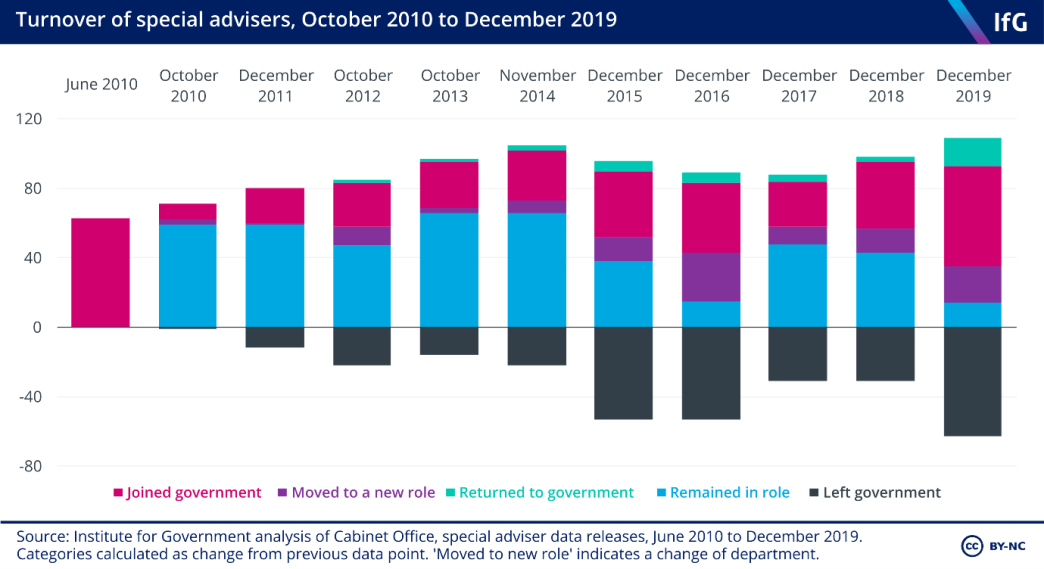
Sending out an SoS
13 February 2020, 17:20
The ministers in charge of departments are now sorted (unless we’re about to be surprised by a completely new department).
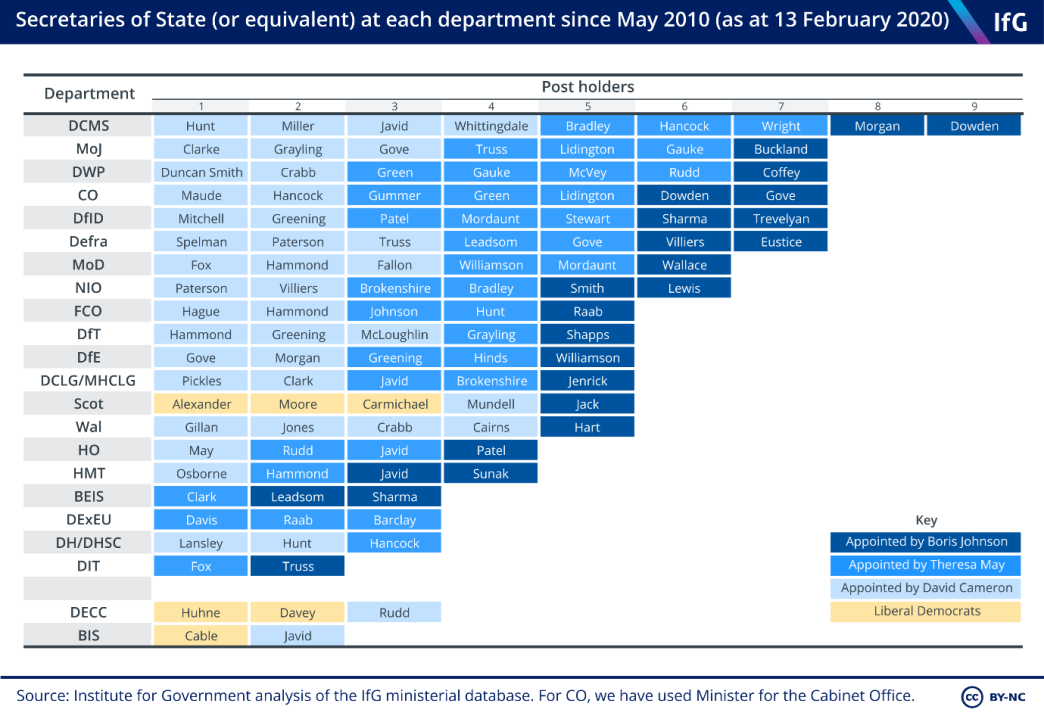
Oliver Dowden becomes the ninth secretary of state (SoS) at the Department for Digital, Culture, Media and Sport since 2010. Contrast that with the Department of Health and Social Care, where Matt Hancock – in post since July 2018 – is only the third person to hold that role in the same time period. Jeremy Hunt, the longest-serving health secretary ever, recently spoke to us about his time in government.
The high level of turnover at DCMS, and various other departments including DWP, MoJ, the Cabinet Office, Defra and DfID – much of which is very recent – disrupts the business of government, as ministers get used to new briefs and departments get used to new personalities and priorities. Much, much more in our recent report.
Meanwhile, Mark Spencer remains chief whip. Deputy chief whip, Amanda Milling, becomes Conservative party chair and will attend Cabinet as minister without portfolio – replacing James Cleverly in those positions, it would seem.
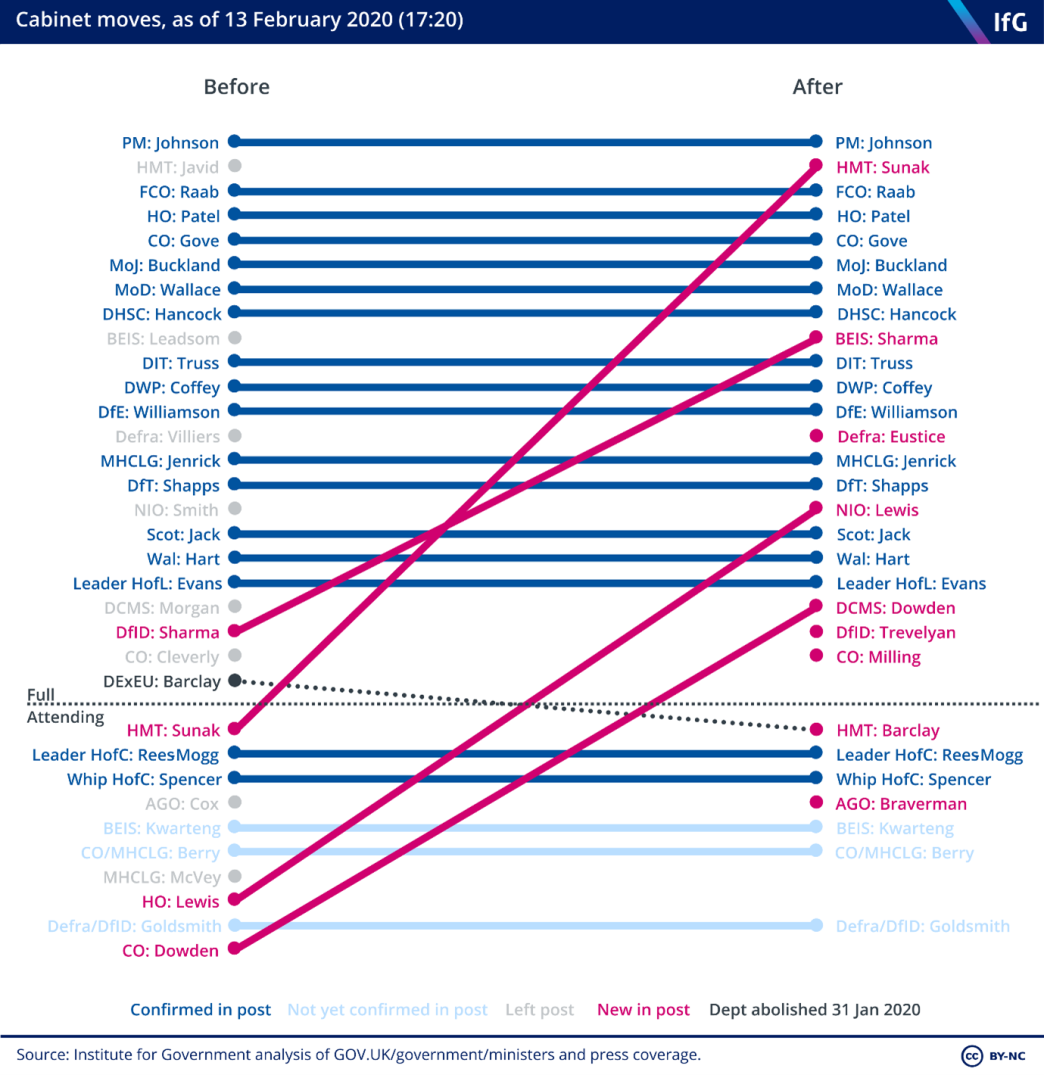
Barclay's back, alright
13 February 2020, 16:33
Steve Barclay - secretary of state at the Department for Exiting the European Union until it was abolished (the department, not the EU) on 31 January - makes a swift return to Cabinet, replacing new chancellor Rishi Sunak as chief secretary to the Treasury.
Meanwhile, another mooted Mogg change has failed to materialise, as Jacob Rees-Mogg remains leader of the House of Commons.
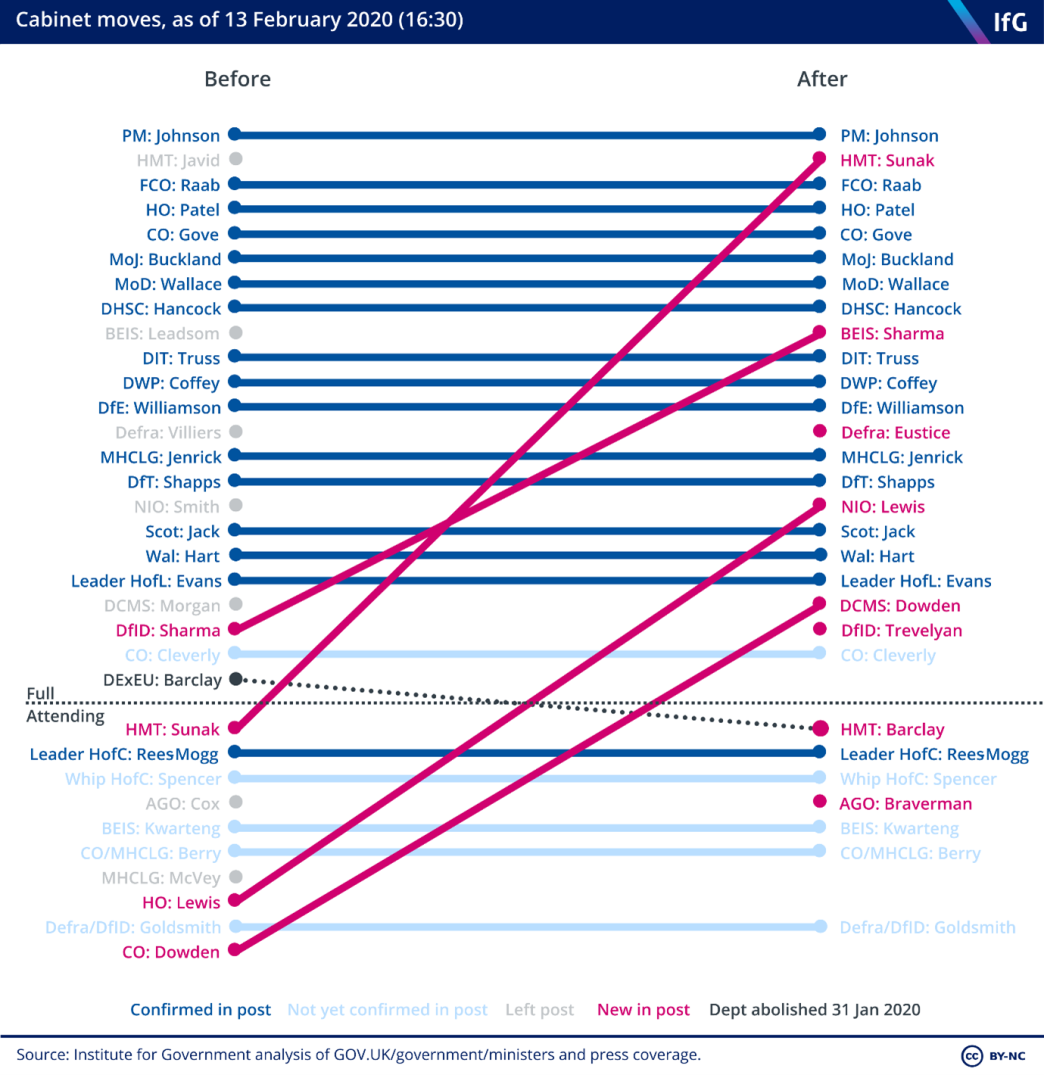
It shouldn't happen to a live-blogger
13 February 2020, 16:21
Of course, as soon as I posted about the Scotland secretary remaining in post, and speculated about what had happened to the 'department of the Union' rumours, Simon Hart was confirmed as Wales secretary and Brandon Lewis moved from the Home Office (where he was Minister of State for Security and Deputy for EU Exit and No Deal Preparation) to replace Julian Smith as Northern Ireland secretary.
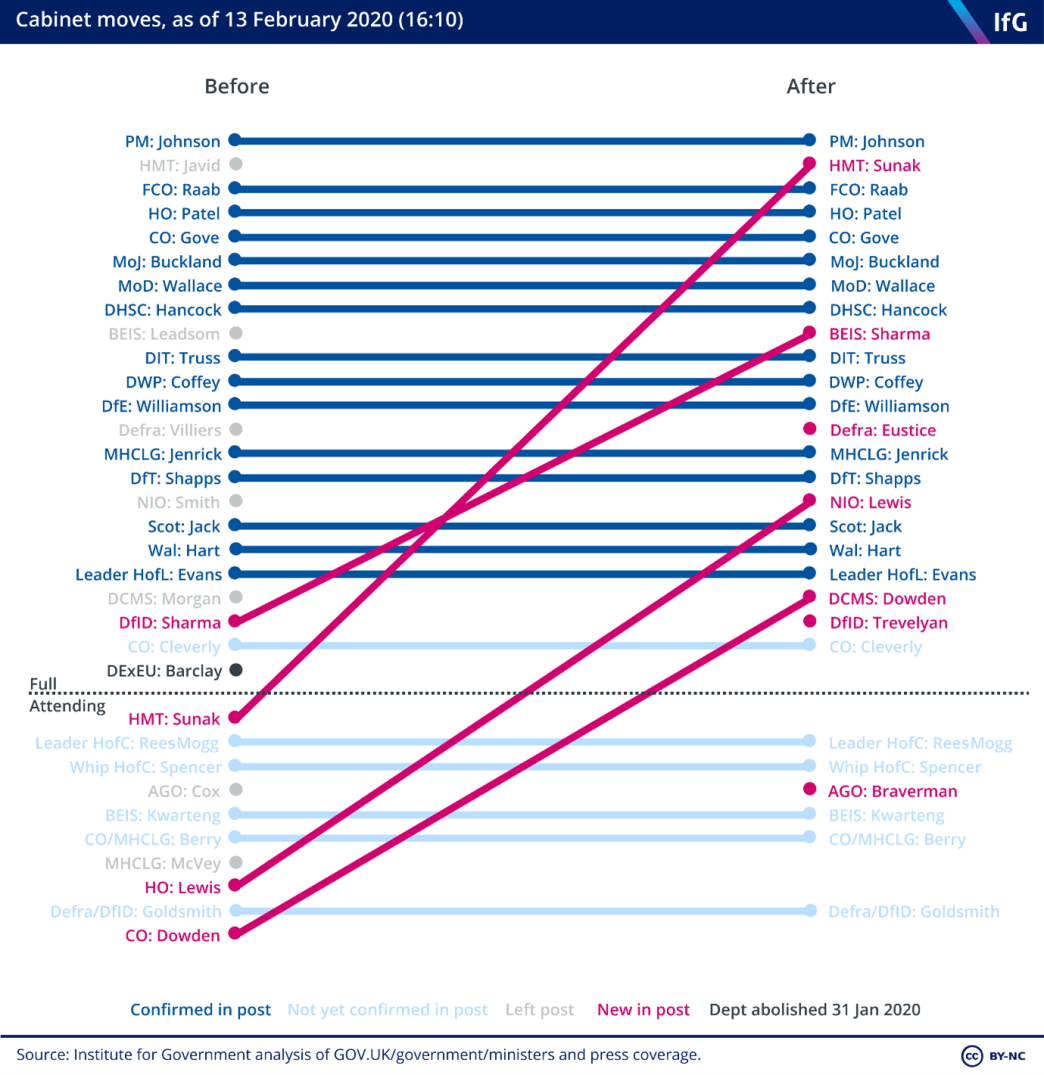
He's all right, Jack
13 February 2020, 16:06
Alister Jack remains Secretary of State for Scotland.
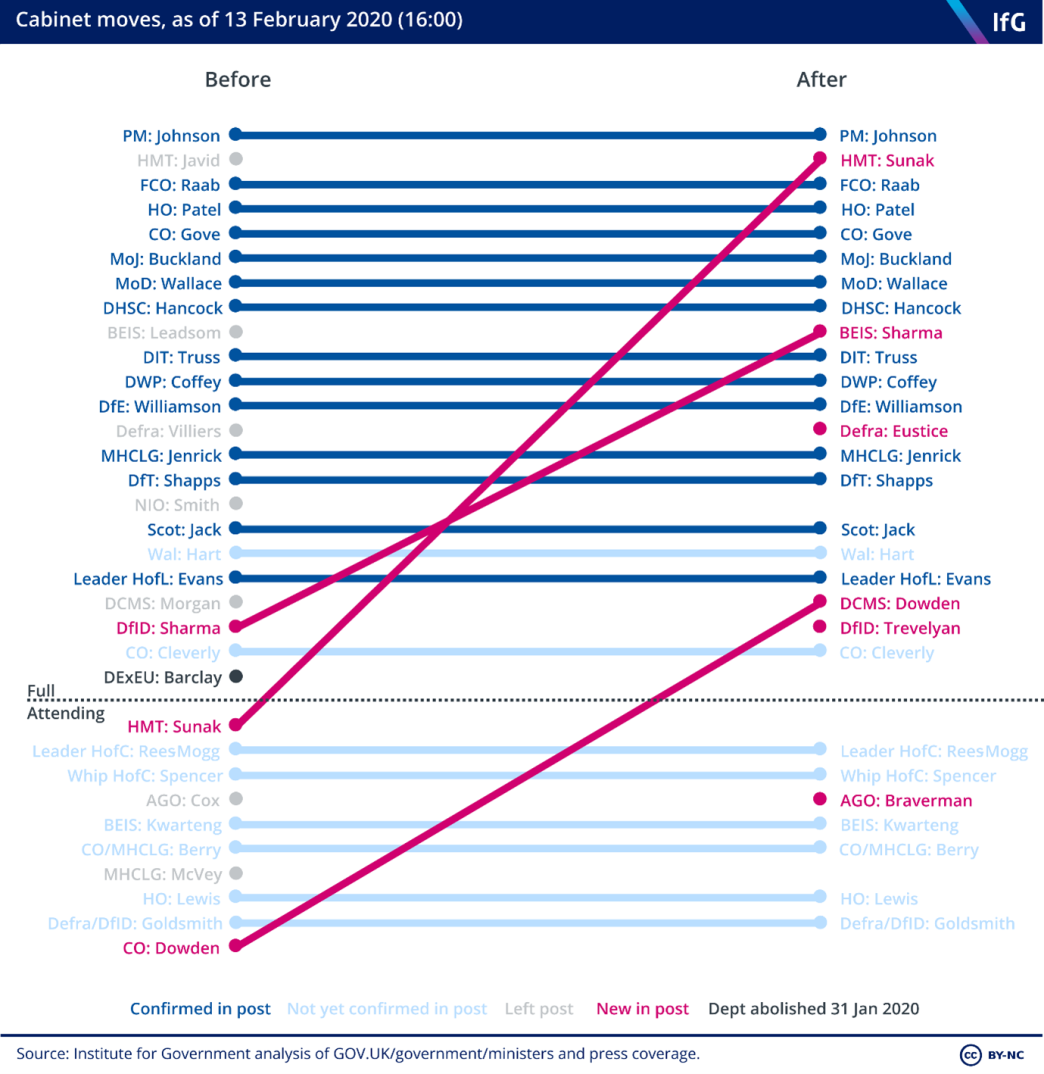
We're still waiting on a new Northern Ireland secretary and confirmation of Simon Hart's position as secretary of state for Wales (he took up the post in December), so we presume another possible machinery of government change - a department for the Union - isn't going to happen.
Nonetheless, Brexit has put severe pressure on the UK Government’s relationship with the devolved administrations, and the ministers for the nations of the UK will need to consider how to repair these relationships and make a positive case for the future of the United Kingdom. The government has not been clear about how the Scottish, Welsh and Northern Irish governments will be involved in the negotiations on the future relationship with the EU. The Institute for Government has previously argued the government should agree and set out detailed plans on how it will involve the devolved administrations in this next phase as soon as possible.
Wallace defends his position
13 February 2020, 15:50
Despite the speculation, Ben Wallace remains defence secretary.
And confirming the speculation - or more accurately, confirming briefing over the weekend from Number 10 - Grant Shapps is going nowhere from Transport.
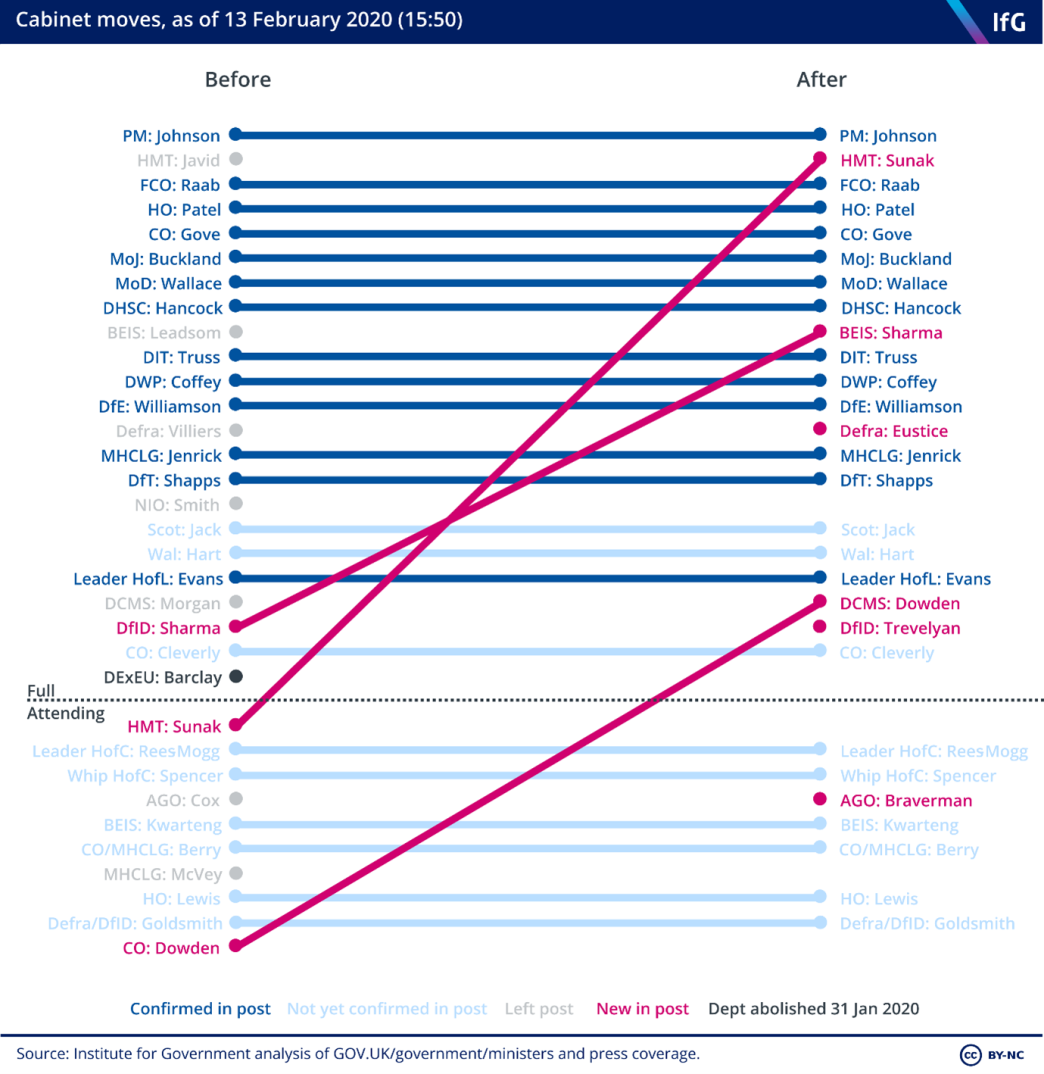
By George
13 February 2020, 15:26
George Eustice is the new secretary of state at Defra (Department of Environment, Food and Rural Affairs).
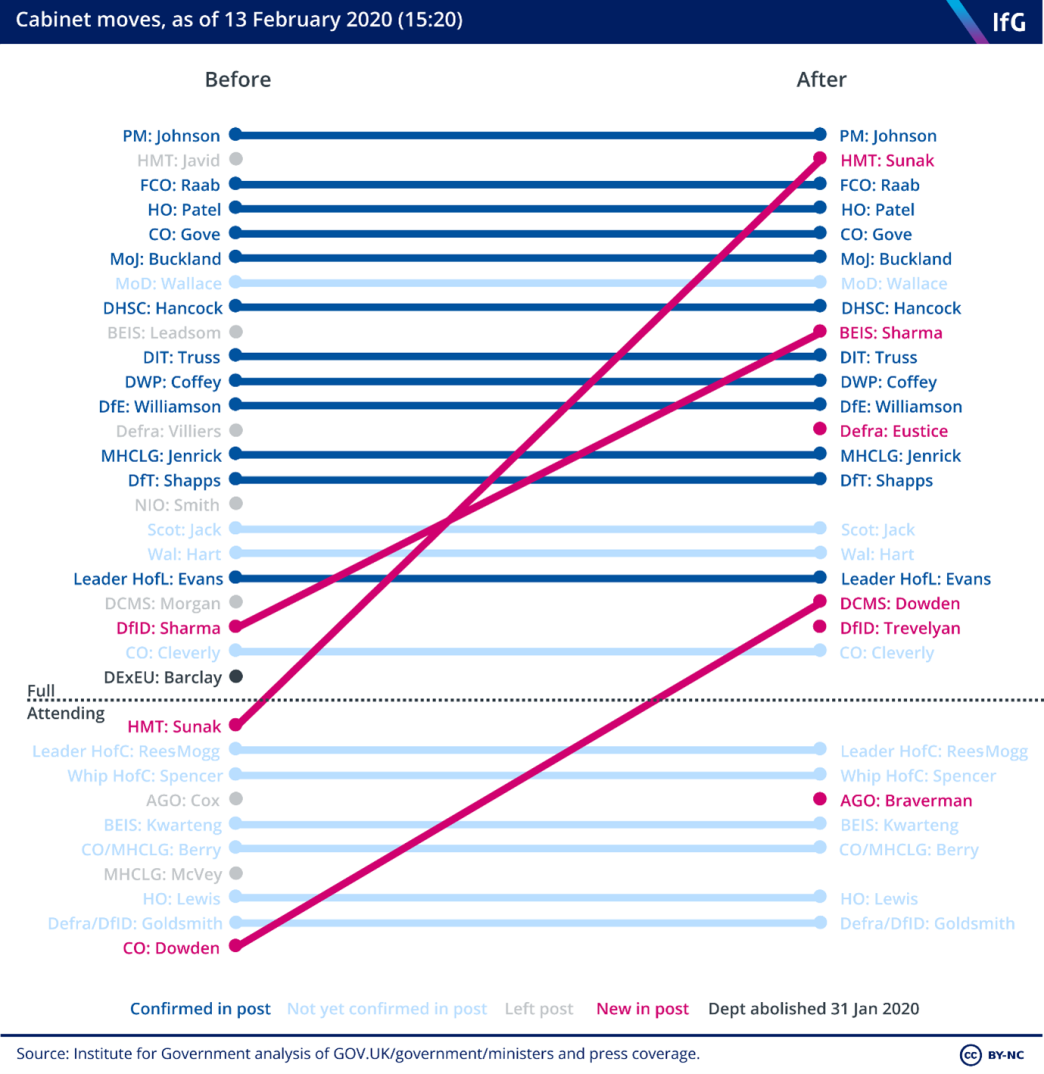
He has held a junior ministerial role in the department since 2013 (apart from a short period outside government in 2019). He told the Institute’s Ministers Reflect project about the benefits of longevity in a role, saying that if you a minister “who stays in position for a long time, in an area where they’ve got expertise, can be incredibly beneficial”. He thought it was important “for a secretary of state, to be able to understand the argument that happened before and why it was had”, rather than have to get up to speed on lots of new issues all at once.
As Defra secretary, Eustice will be responsible for setting up the UK’s new agricultural policy outside the EU. He will also take part in discussions over our new relationship on fishing with Brussels. He was involved in drafting the Agriculture and Fisheries Bills currently in Parliament, and has first-hand experience of negotiating fishing quotas as the UK’s representative minister in Brussels – he was one of the last British ministers to attend an EU meeting in Brussels in December 2019. He will also have to work closely with the devolved administrations in the role – both agriculture and fisheries are devolved policy areas but will likely require discussion between the UK and devolved governments. And he joins the ranks of answers to the question, how many people have been promoted within their departments?
Two more Cabinet ministers have been confirmed in post: Gavin Williamson at the Department for Education, and Robert Jenrick at the Ministry of Housing, Communities and Local Government.
The reappointed Secretary of State for Education will be responsible for delivering a large increase in school spending, reversing the per pupil spending cuts since 2010. Williamson will need to focus on spending that money well. Our research shows that addressing the clear staff pressures on schools – recruiting, and in particular retaining, enough teachers - will be a priority.
Meanwhile at MHCLG, the most senior minister may be staying post but the most senior official will not be: permanent secretary Melanie Dawes is off to lead Ofcom.
And not forgetting that MHCLG has lost a minister today: housing minister Esther McVey. Her replacement will be the tenth person to hold that post since 2010.
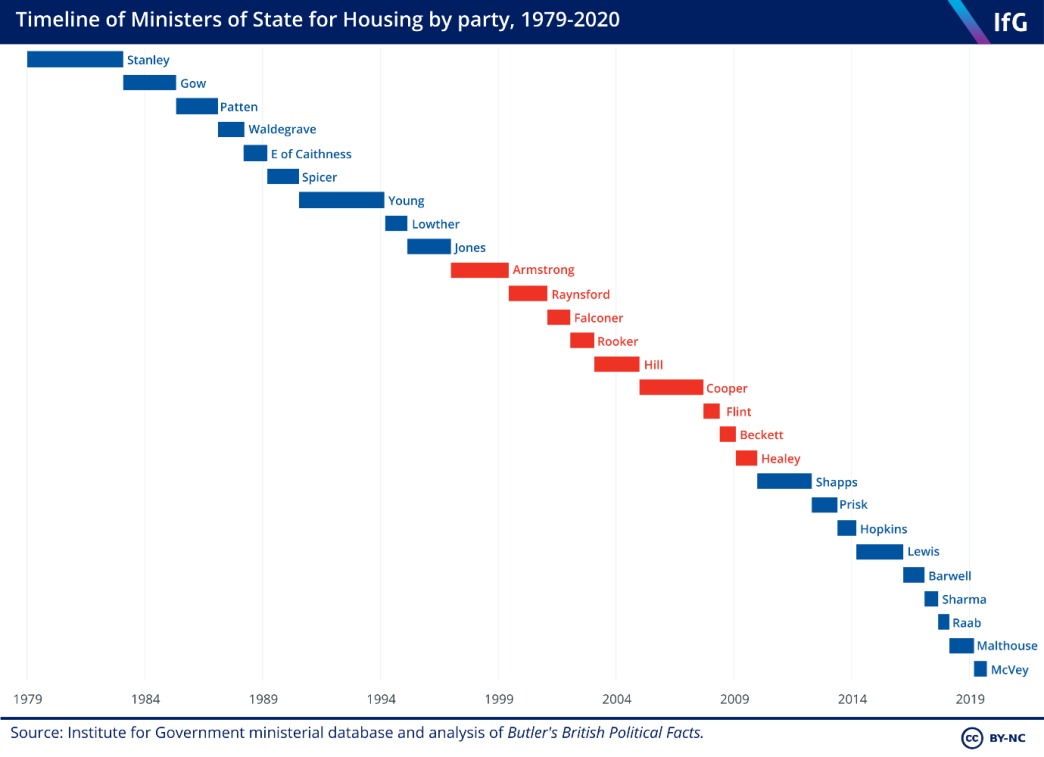
Braverman - second woman AG
13 February 2020, 14:56
Suella Braverman, formerly a junior minister at the now-defunct Department for Exiting the European Union (and one of the record four ministerial resignations on one day under Theresa May) is the new attorney general, replacing Geoffrey Cox.
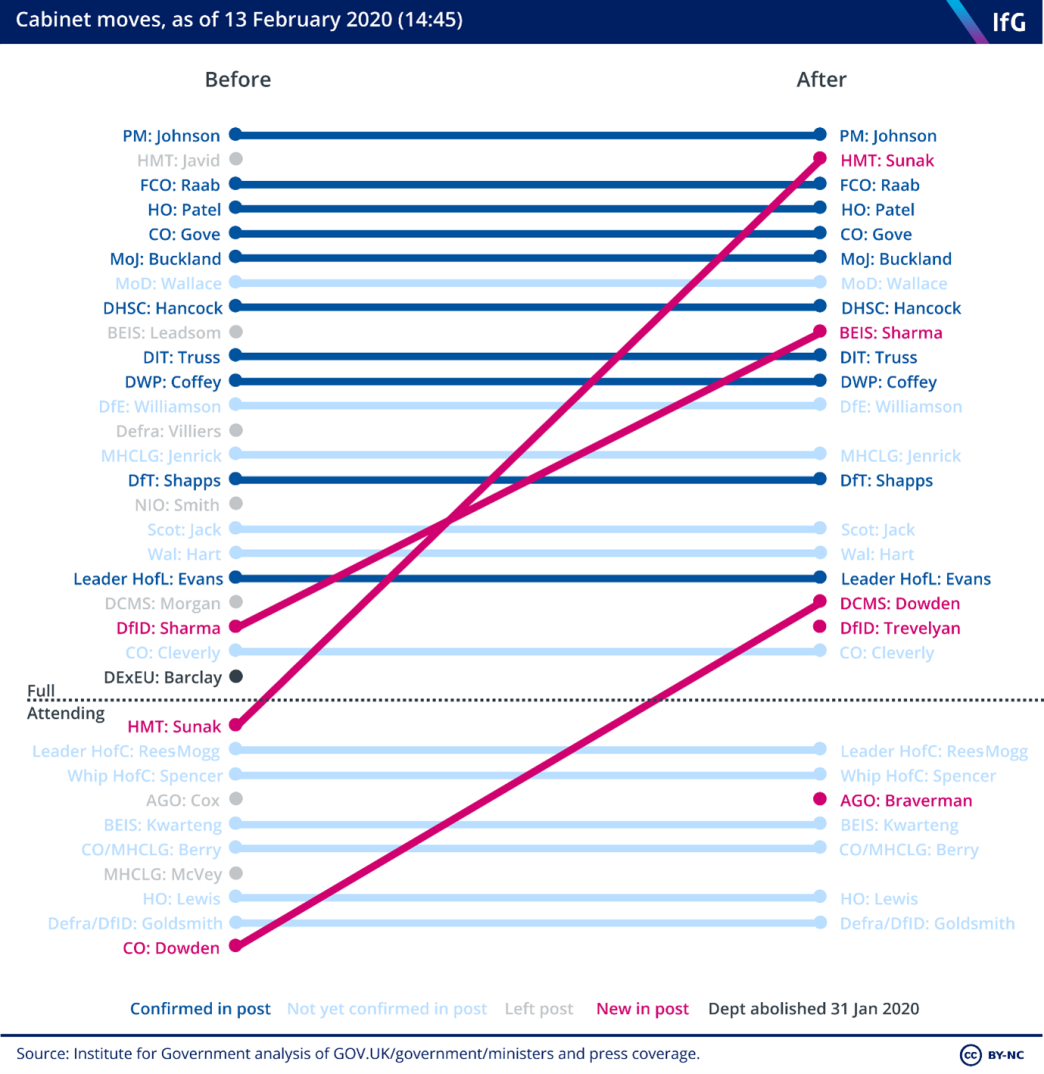
She is the second woman to hold the role (after Baroness Scotland under New Labour). I think that leaves only one currently existing Cabinet position that's never been held by a woman: Chancellor of the Exchequer. (The chart below is slightly old but you get the idea.)
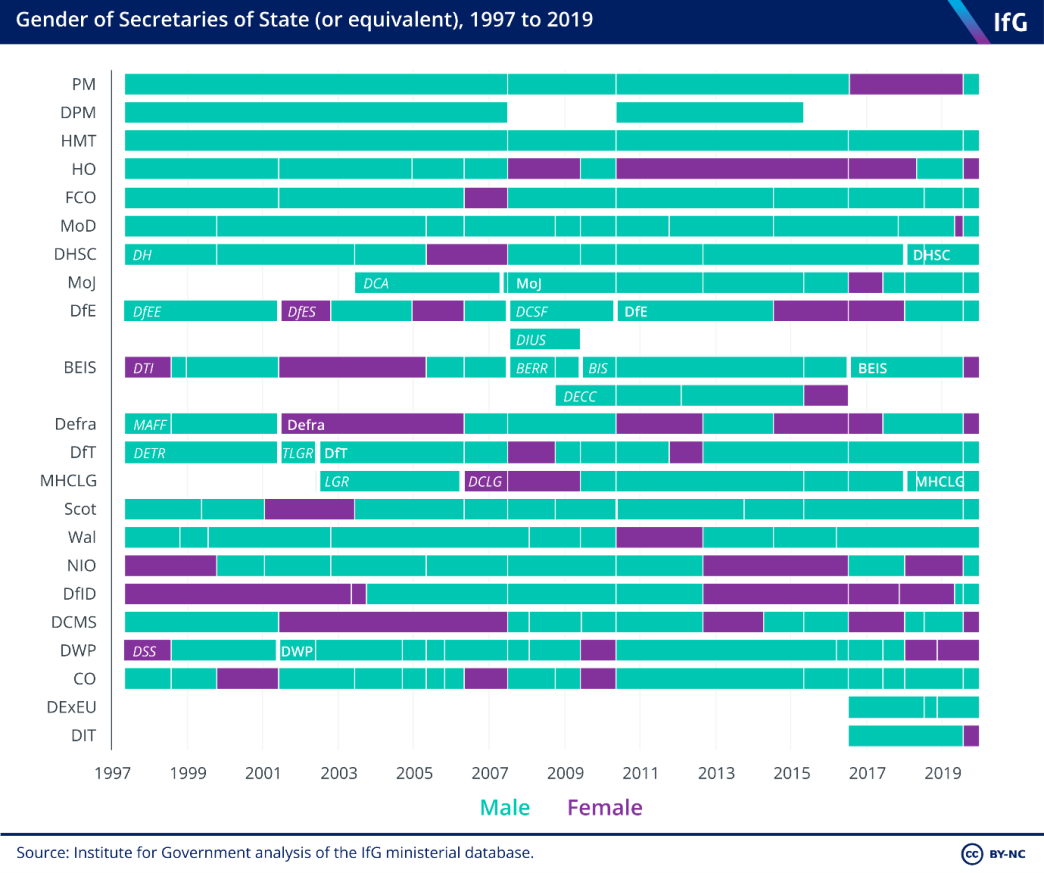
She takes on a role that has historically been low profile but has become more contentious recently. Dominic Grieve said that, “the attorney has to have a broad back – there is no doubt that is one of the necessary attributes of the office”. And Geoffrey Cox – Braverman’s immediate predecessor – talked to the Institute this week about the role, and said that he would be in favour of a “carefully calibrated investigation of the judicialisation of politics”. With rumours that Cox may be heading such a review, it will be interesting to see what approach Braverman takes to relationships with the judiciary.
No Coffey break
13 February 2020, 14:40
Thérèse Coffey remains secretary of state at the Department for Work and Pensions - she was appointed in September 2019 after Amber Rudd resigned. Baroness Evans remains in post as leader of the House of Lords.
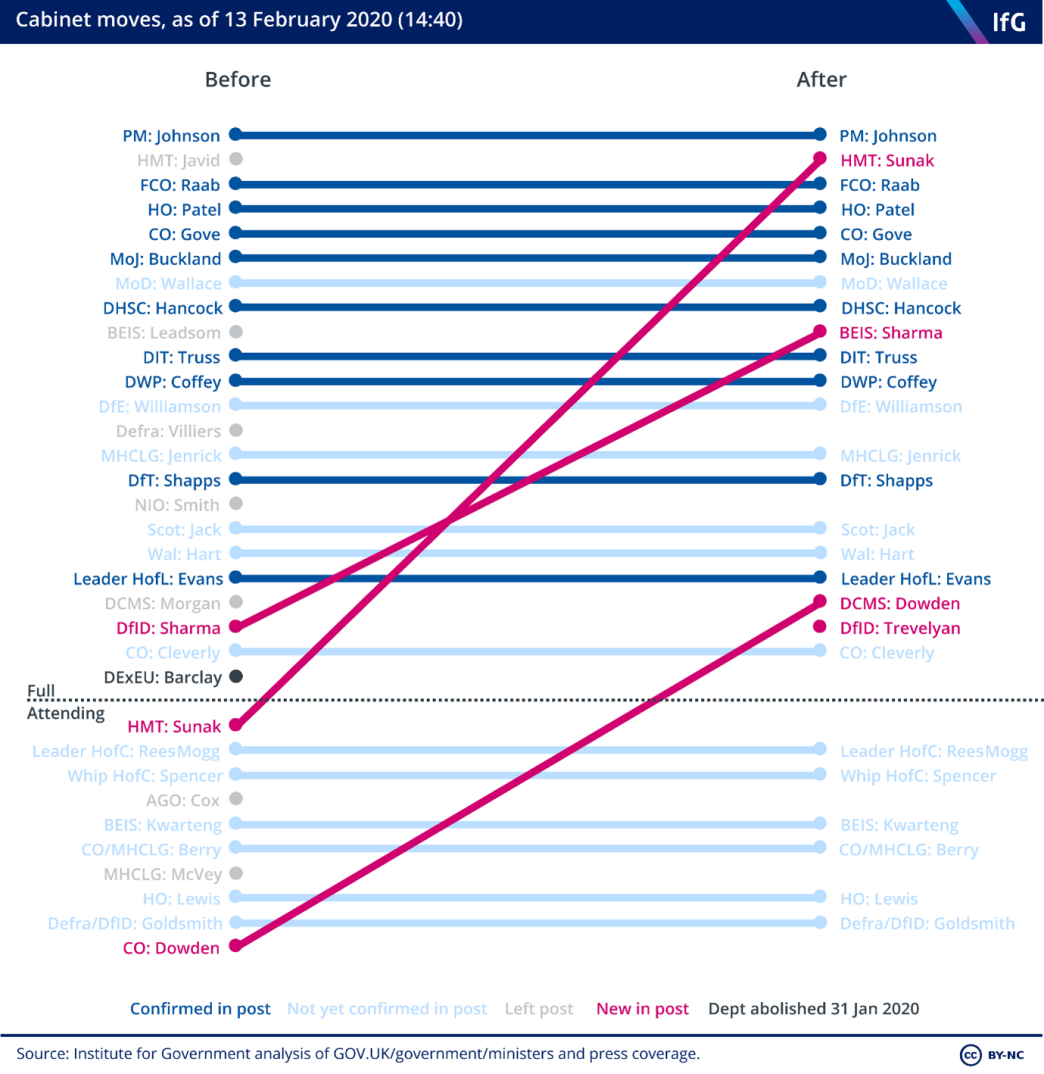
The MoG that didn’t bark – again
13 February 2020, 14:22
One of the big unknowns for this reshuffle was whether any departments would be reorganised. There had been some early briefing that DfID and the FCO might be brought closer together, as has happened in the past; that a super business and trade department could be recreated; and (as is always rumoured) that the department for digital, culture, media and sport was going to be closed. None of that seems to have happened.
Presumably that decision has been made because the prime minister and his advisers have read the Institute’s research on changes to departments’ responsibilities. We know that they are hard work and very disruptive to the day-to-day work of government departments – and without a clear reason behind them, they’re likely to fail to achieve their objectives.
Here are all the major machinery of government (MoG) changes since 1975:
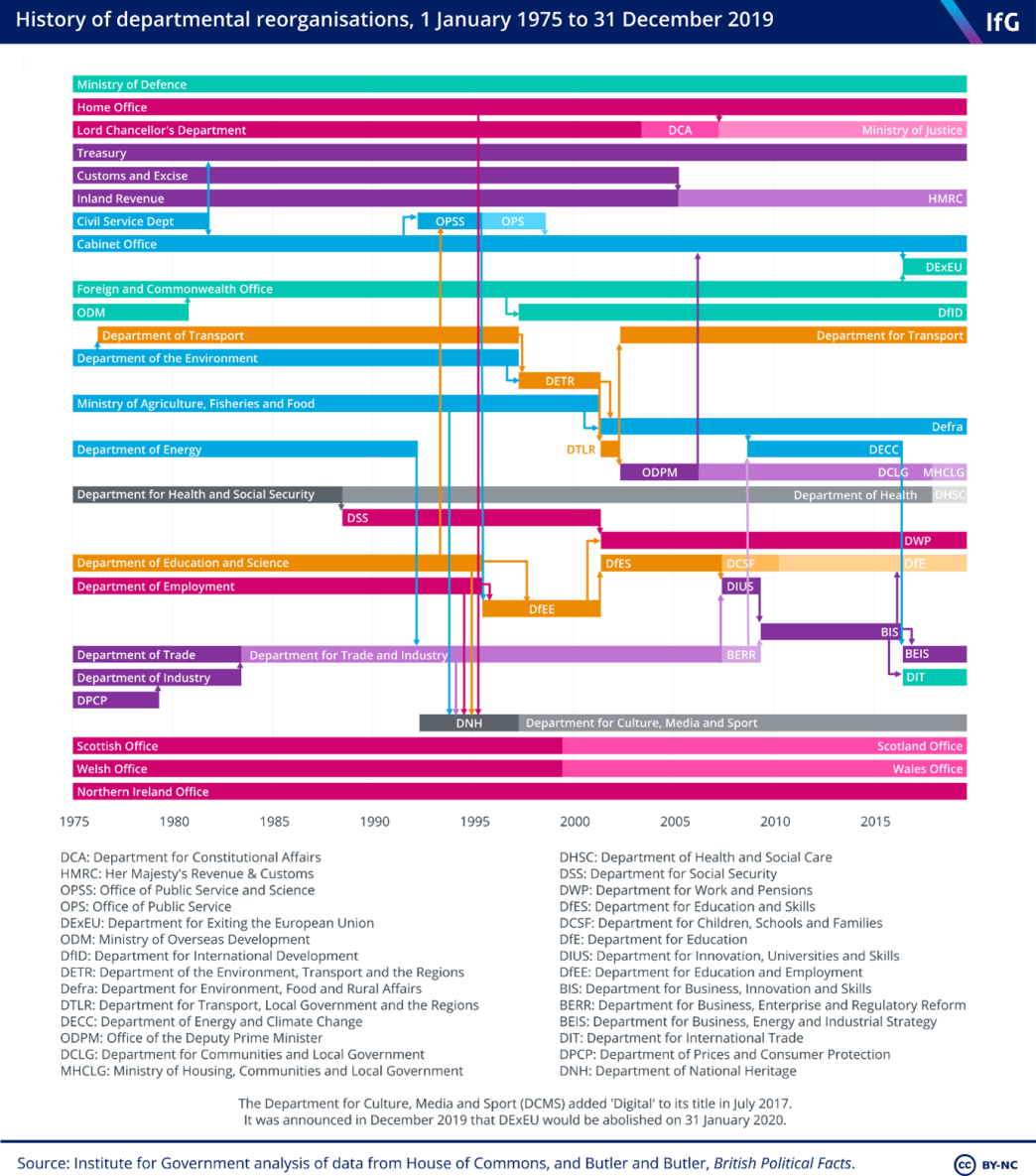
Minister of fun - and fundamentals
13 February 2020, 14:10
Oliver Dowden becomes a full member of the Cabinet as the new secretary of state for digital, culture, media and sport. He moves from being minister for the Cabinet Office - a role now held by Michael Gove - to replace Baroness (Nicky) Morgan.
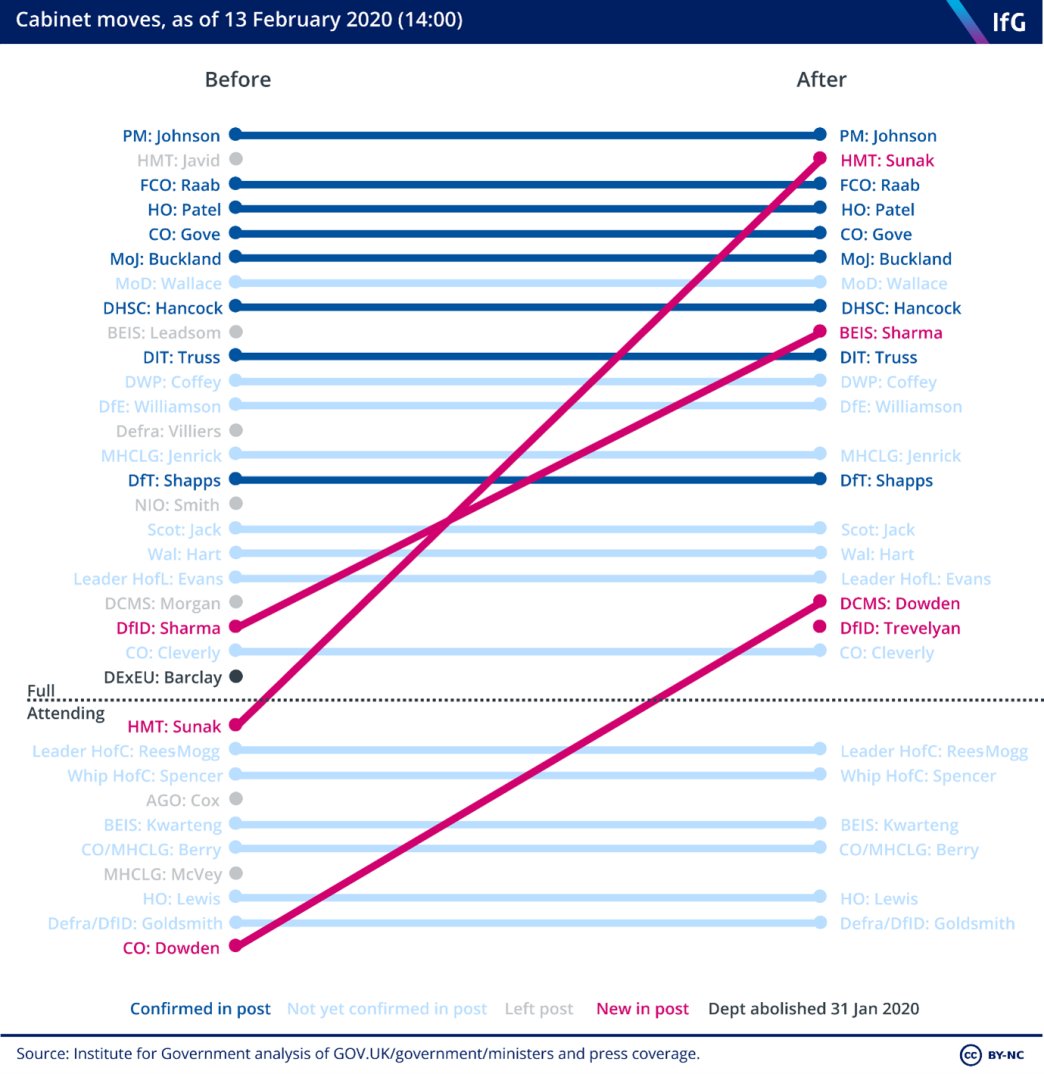
Just this week, we published an interview with Jeremy Hunt, the first culture secretary in the 2010-15 coalition government. He told us that it is a role with a wide range of responsibilities: “DCMS is an odd department because I was effectively responsible for five very distinct things which weren’t really related: culture, media, sport, technology and the Olympics.”
Clearly the Olympics are out of the way, but Dowden will be responsible for overseeing preparations for the 2022 Commonwealth Games in Birmingham, as well as the Festival of Great Britain and Northern Ireland in the same year. He’ll also be responsible for overseeing the government’s approach to online harms, a big theme for both Theresa May and Boris Johnson. And, of course, government data and the National Data Strategy.
Some Cabinet ministers have been confirmed in post: Liz Truss remains trade secretary - which presumably means any mooted merger of DIT and BEIS is off - and Matt Hancock remains health secretary.
Our updated chart also shows Anne-Marie Trevelyan as new international development secretary. Like Rishi Sunak, she's had a rapid rise through the ministerial ranks - from being a parliamentary under secretary of state in July 2019, to minister of state in December 2019, to a secretary of state now.
And speaking of Rishi Sunak, here's some advice for the new chancellor in a new comment piece from Tom:
"A government with a working parliamentary majority of 87 might be expected to be largely free in its choices. However, Boris Johnson’s first budget is likely to come up against constraints that the government has imposed on itself. The government’s own fiscal rules (proposed and supported by Sajid Javid, the now former chancellor) – specifically, that tax revenues should cover day-to-day spending – limit the scope to increase spending on public services.
The rules are reported to have caused tension between the Treasury and No.10, with the PM’s office wanting to announce policies that are incompatible with them. With Javid gone, Boris Johnson might be tempted to ignore the rules and press ahead with ambitious spending pledges.
But there are good reasons to have, and follow, fiscal rules. The prime minister must resist the temptation to ignore these. Despite the chancellor’s resignation, his fiscal rules should stay in place.
New international development secretary
13 February 2020, 13:43
Anne-Marie Trevelyan has been appointed as international development secretary. Previous holders of the job include Justine Greening, who told us that the role requires a mix of different skills:
DfID is a massive spending department, so again it’s a portfolio question. But there’s a huge dose of foreign affairs in there that you can’t really quantify.
Trevelyan’s appointment also presumably puts paid to the speculation around a possible merger of the Foreign Office and DfID (we already know Dominic Raab will continue as foreign secretary). Presumably the two will continue as standalone departments, as they have been since 1997.
Sharma moves, Buckland stays
13 February 2020, 12:44
Two more Cabinet positions to confirm: Robert Buckland remains justice secretary, while Alok Sharma moves from DfID (will the department survive?) to replace Andrea Leadsom as business secretary.
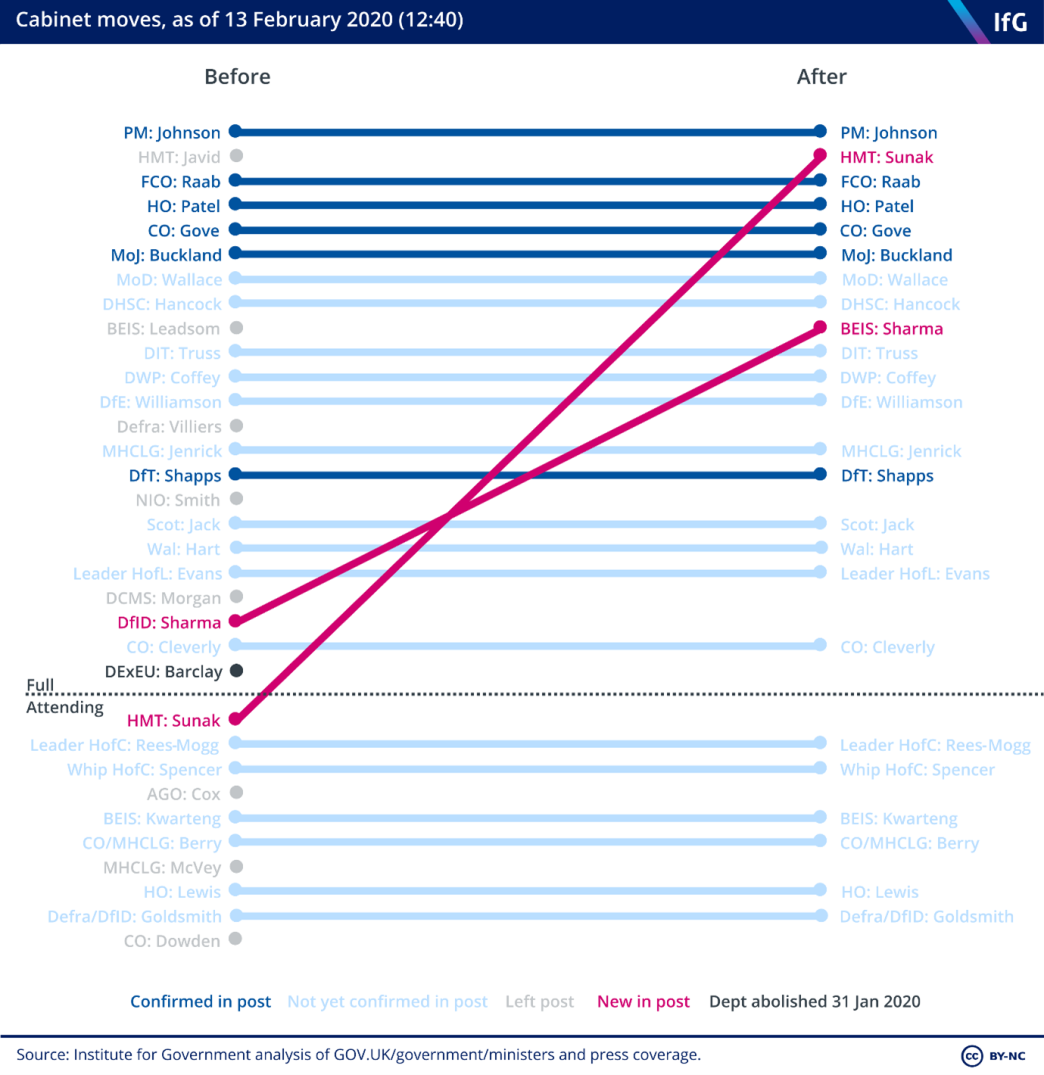
Sharma also becomes the minister responsible for COP26, the international climate change conference to be held in Glasgow later this year. Tom wrote about the issue during the election:
Climate change has featured more prominently in this election campaign than any before, including the first ever televised climate debate featuring the leaders of all the main parties – except Boris Johnson, who has snubbed the invitation. But while the parties’ manifestos contain a range of targets for reaching net zero, the next government must deliver a credible plan to reducing carbon emissions.
Sunak rather than later
13 February 2020, 12:21
Rishi Sunak is the new Chancellor. He previously held the number two position in the Treasury – that of chief secretary. His only previous role in government was as Parliamentary Under Secretary of State at the Ministry of Housing, Communities and Local Government between January 2018 and July 2019.
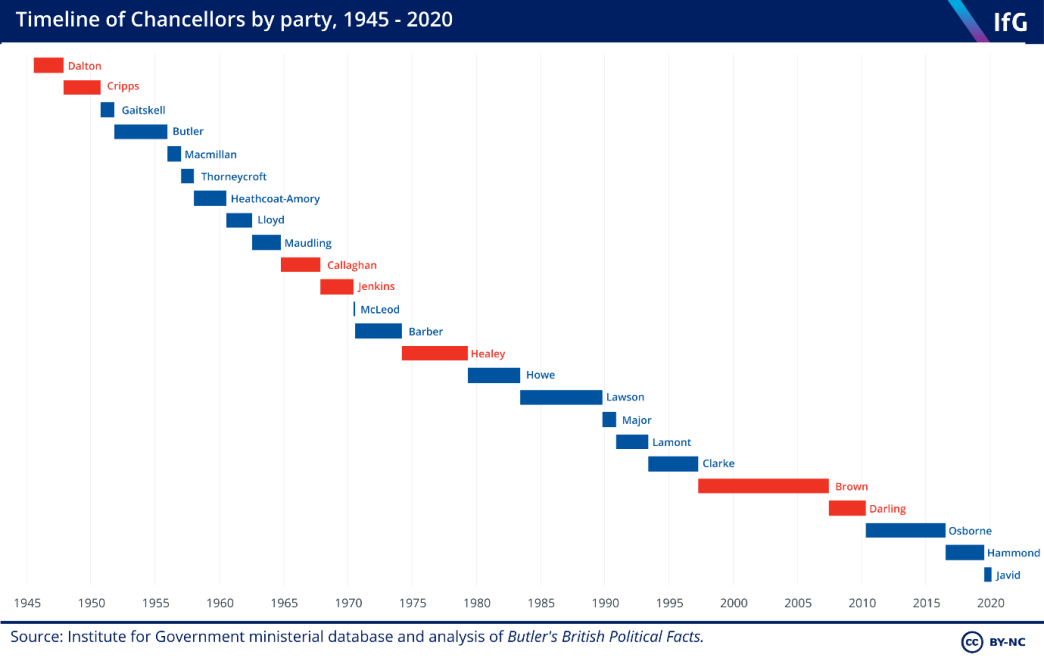
We think Javid is the shortest-serving Chancellor since Iain Macleod in 1970 – who is, I think, one of only five Cabinet ministers to die in office since 1945.
Michael Gove has also been confirmed in post as Chancellor of the Duchy of Lancaster. But it looks like he’s also become Minister for the Cabinet Office, a position previously held by Oliver Dowden, and which would put him in charge of civil service reform. Alex pondered whether Gove would have the time to do it. And does this mean Dowden is in line for a heavily-tipped move to become a full member of the Cabinet?
Priti Patel remains as Home Secretary.
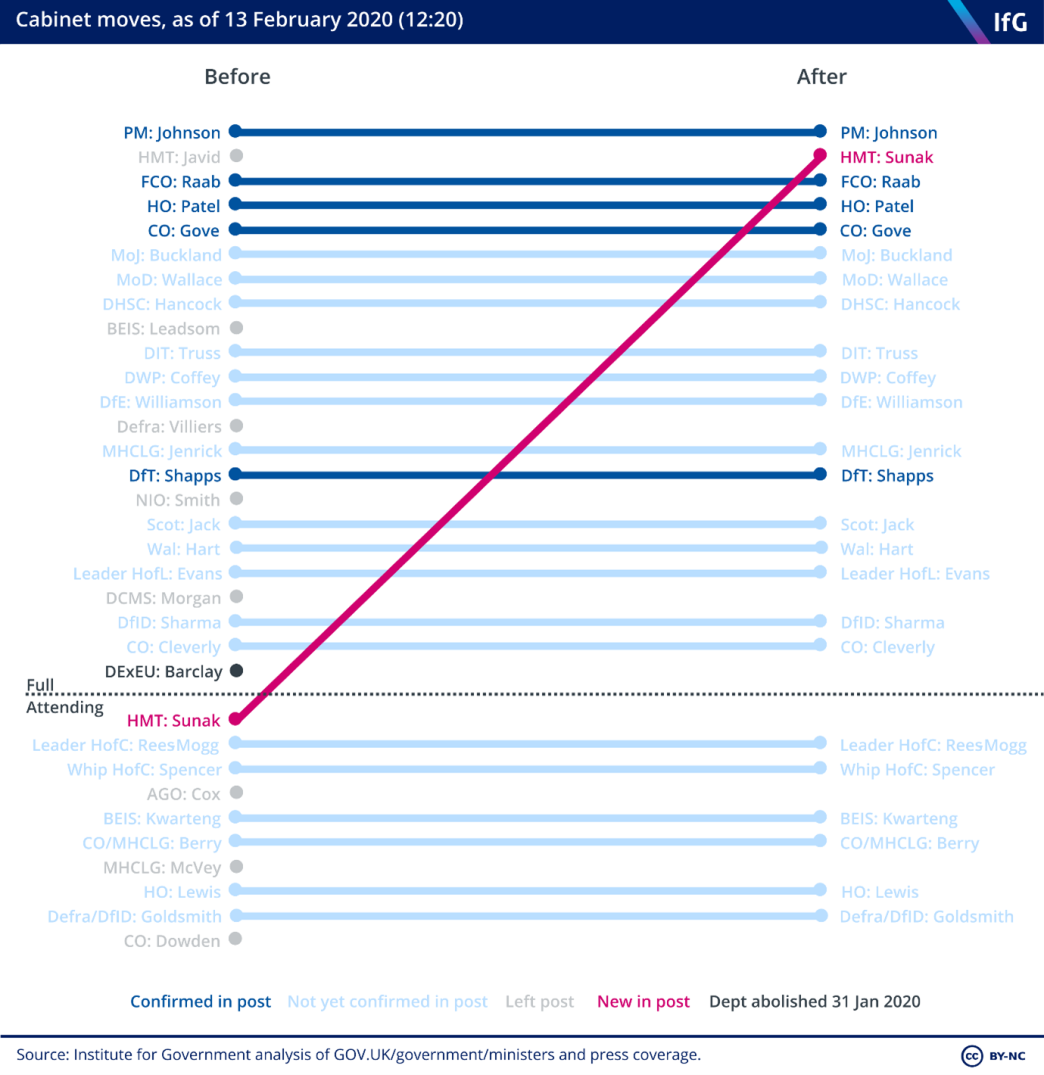
Javid out
13 February 2020, 11:57
Sajid Javid is out as Chancellor of the Exchequer after just six months, and without having delivered a budget.

Gemma had some advice for Javid on how to be a tax reforming chancellor – well worth dusting off for whomever is appointed next:
Tax is one of the most powerful tools that the government has at its disposal. But the Conservative Party’s manifesto, which promised much in the way of investment in public services, spelt out only minimal specific new tax policies and imposed some tight constraints by ruling out any increases in the rates of the three largest taxes – income tax, National Insurance contributions and VAT.
Efforts at tax reform have tripped up many past chancellors, but it need not be an insurmountable issue, as a new Institute for Government report – drawing on interviews with former chancellors and those who have served and advised them – outlines.
And one of the first things the new chancellor will need to think about is the Spending Review - here's our advice on how to run it well.
Apropos of nothing... Previous chancellor Philip Hammond told us that there is always tension in the relationship between No 10 and No 11. Talking of his relationship with Theresa May he said:
"We had some difficult conversations over our time in office together, some of them over fiscal issues, but I don’t think that’s unusual. I think all prime ministers want to spend more money than most chancellors think is prudent."
Whitehall hokey-cokey
13 February 2020, 11:18
A few weeks back there was lots of speculation that the Department for International Development (DfID) may be folded into the Foreign and Commonwealth Office (FCO), in part to try to join up development policy with wider foreign policy. We don’t know if this will happen, but if it did, it would not be the first time – DfID and its predecessors have been in and out of the FCO for over 50 years.
We held an event to discuss the pros and cons of such a merger last week. There was general consensus that a merger would not make sense – not least because of the disruption it would cause – but that there was a need for better strategic thinking on foreign policy across government departments.
Former DfID secretaries of state would agree. Justine Greening, who headed the department for four years, told us that “people in other departments, particularly the Foreign Office, didn’t always spend the aid wisely. It’s as simple as that. They would sometimes be prepared to put money into quite nugatory, non-strategic projects that weren’t really going to change anything. And then they weren’t always managed and controlled.”
Transport ministers on the move
13 February 2020, 10:36
Secretary of state Grant Shapps may be staying where he is, but two junior ministers at the Department for Transport have tweeted that they’re leaving: George Freeman and Nusrat Ghani.
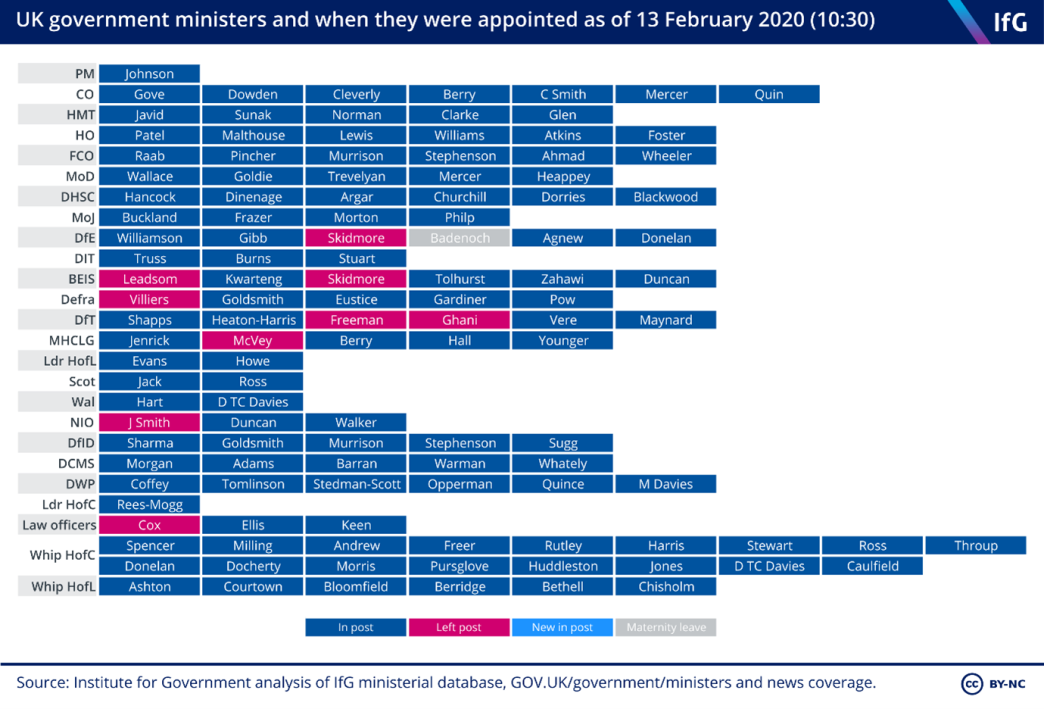
You can read our Ministers Reflect interview with George Freeman here. Previous transport secretary Chris Grayling told us that ‘nobody’s really in charge’ of the railways… Nusrat Ghani’s successor will have to see if they agree.
DfT is responsible for a lot of government’s biggest projects (and has the highest value of projects deemed to be at risk of not being delivered on time and on budget of any department). One of the biggest of those projects is, of course, HS2.
Belfast and loose
13 February 2020, 10:26
Some further analysis from Jill on Julian Smith’s departure:
The first casualty of the Johnson reshuffle is also the Secretary of State most external observers think has been his administration's biggest success - Northern Ireland secretary Julian Smith.
Only a fortnight ago he won the Spectator's top political award for his achievement in getting the Northern Ireland institutions back up and running. In his brief time in Northern Ireland he has managed to command respect from both the parties and external stakeholders - as tweets showed last night when his despatch was being trailed.
His successor faces a difficult in-tray. The new executive is still precarious - and the report on the Renewable Heat Incentive scandal will put it under further pressure when it is published in a month's time. The New Decade, New Approach agreement is still a long way from being full implemented, and Smith's departure - along with the potential departure of its other sponsor, Tanaiste Simon Coveney, after Fine Gael's poor showing in the Irish election – means a huge haemorrhage of ministerial memory (and the NIO is changing its top civil servant at the same time with NIO newbie Madeleine Alessandri taking over from NIO lifer Sir Jonathan Stephens). And as business groups are keen to point out, the NI protocol is very much unfinished business. All this is made even more complicated by the potential that Sinn Fein may end up in power both sides of the border.
So why "bin" Smith now? Was he too honest in contradicting the PM's view that his deal inevitably meant new border bureaucracy in trade between NI and GB? Did the PM really not study the small print of the New Decade, New Approach deal and not realise how Smith proposed to square the legacy circle? Or was he just too likely to resign over something later this year - he was allegedly on suicide watch last autumn? Or is this a first move to replace the territorial secretaries of state with a Minister for the Union - a title that Johnson awarded himself last summer, but which sits badly with the UK's responsibilities under the Belfast/ Good Friday Agreement?
Whoever succeeds Smith has a hard act to follow. The long-suffering people of Northern Ireland will be worried that yet again they are victims of internal Conservative politics and end up with someone with little knowledge of the place or its history. They would be well advised to heed the advice of former secretary of state, James Brokenshire, and start reading their history books. The risk for Johnson is that this further fuels the sense that the UK government cares little about the interests of NI and further accelerates moves towards a border poll.
Cox, Villiers out
13 February 2020, 10:15
Journalists are reporting two more Cabinet departures:
• Geoffrey Cox, who spoke at the Institute yesterday, has gone – just as questions to the Attorney General are happening in the Commons
• Theresa Villiers, environment secretary, becomes the third woman to leave Cabinet today after Andrea Leadsom and Esther McVey.

Leadsom and McVey leave Cabinet
13 February 2020, 10:09
There has been a lot of discusison about the gender balance of Cabinet - and we now know at least two women will be leaving: Andrea Leadsom, previously secretary of state at the Department for Business, Energy and Industrial Strategy, and housing minister, Esther McVey.

McVey's departure means we'll have a TENTH housing minister since 2010.
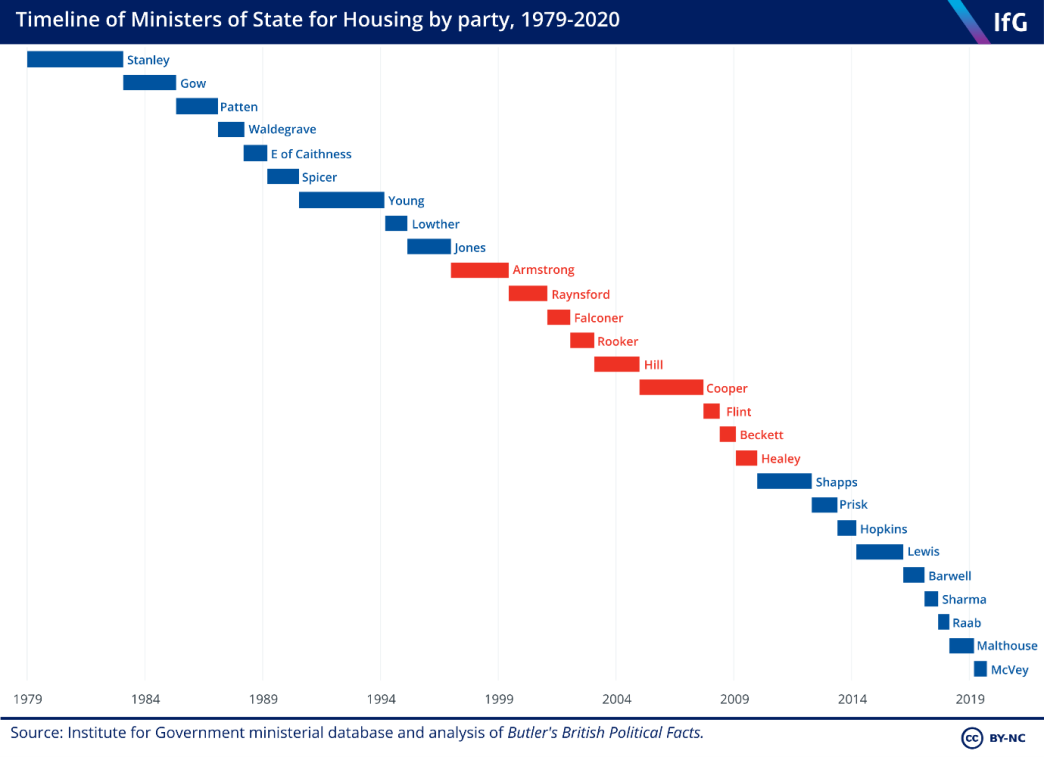
Gavin Barwell is best known as Theresa May’s chief of staff following the 2017 election, but before that he was housing minister for around a year. He talked about some of the difficulties of the job, where the main policy levers are divided between many different departments and the housing minister is rarely able to get them all working together:
"One of the problems with housing policy is that MHCLG [DCLG was renamed the Ministry of Housing, Communities and Local Government in 2018] doesn’t own some of the most important levers. So, there’s a whole load of market interventions, Help to Buy being the obvious example, but also some of the housing guarantees, and stamp duty, that are HMT [Her Majesty’s Treasury] policy leads, and then there’s a whole heap of money being spent by DWP [Department for Work and Pensions] on housing benefit, which I always felt could be spent more productively than it was being spent. But you don’t control those policy areas."
He also said that there are often ideological approaches to housing policy, which he didn’t think was very helpful:
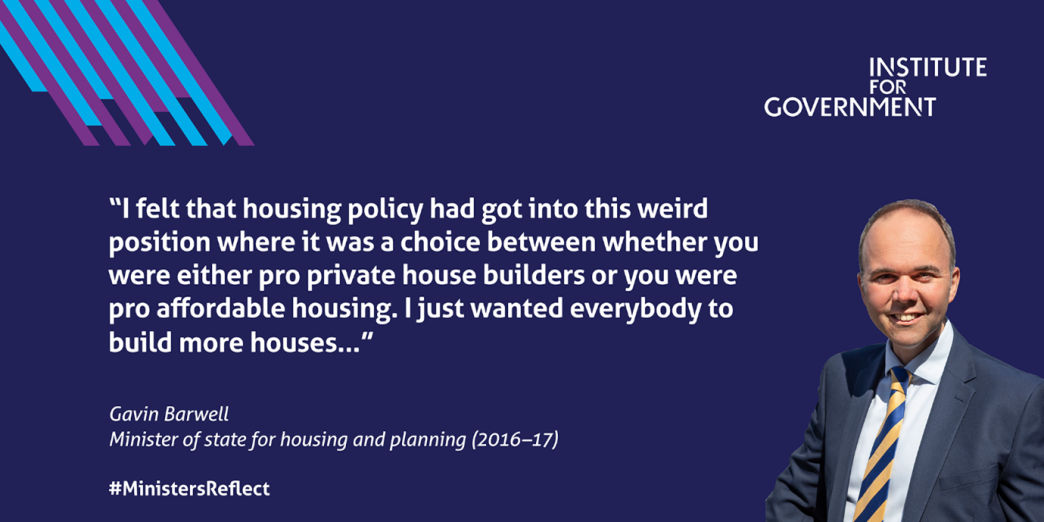
Ministers reflect
13 February 2020, 09:47
Our Ministers Reflect archive has some useful advice for Julian Smith’s replacement as Northern Ireland Secretary, and some reflections from Jo Johnson on his time as universities minister.
Smith’s predecessor, James Brokenshire, said that one of the big changes in taking on the role of Northern Ireland secretary was the fact that he suddenly had bodyguards. “And immediately, you come out of that room [in Downing Street] and one of the first people you meet is your close protection team.”
He also said that while the Northern Ireland secretary role is not very high-profile in Westminster, it is hugely important in Northern Ireland itself. And he also said that the first thing any new secretary of state should do is get to grips with the complex history of Northern Ireland:
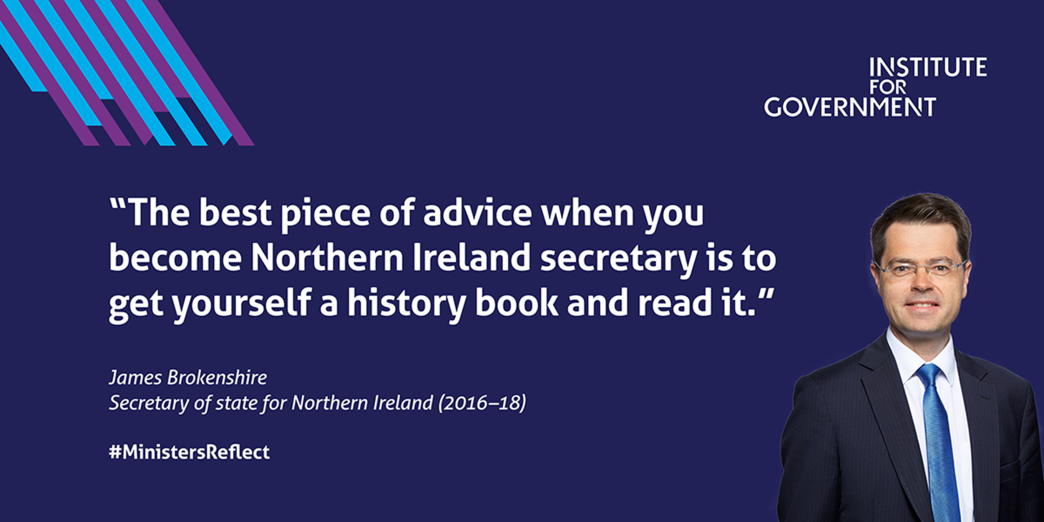
One of Skidmore’s predecessors as science minister is of course Jo Johnson, the prime minister’s brother. He served in that role between 2016 and 2018 and had very good things to say about it:
"it was just a really, really great role, a really exciting role. It’s one which offered a chance to interact with lots and lots of brilliant people across our science and research communities and to deal with an issue which really mattered to young people. The question of how they could get better value for money from their time at university. And which from time to time became politically very important too. So it was a role I enjoyed greatly."
He also had a warning for would-be ministers, telling them ‘If you don’t love the brief and if you’re not absolutely passionate about it, these jobs can be very painful because they’re enormously challenging, and if you’re not passionate about it, genuinely passionate, it’s very hard to do.’”
Will the next science and universities minister share Johnson’s enthusiasm?
Spending more time with his family
13 February 2020, 09:42
It looks like Chris Skidmore is joining Julian Smith on the backbenches.
Skidmore had been minister for universities, science, research and innovation. He replaced Jo Johnson, the prime minister’s brother, when he resigned from Cabinet in September – although Skidmore didn’t attend Cabinet in the role. (He did attend Cabinet under Theresa May.)
Welcome to the reshuffle live blog
13 February 2020, 09:33
Good morning, and welcome to our live coverage of Boris Johnson’s ministerial reshuffle.
It looks like we have our first Cabinet move – Julian Smith appears to have left his post as Secretary of State for Northern Ireland.
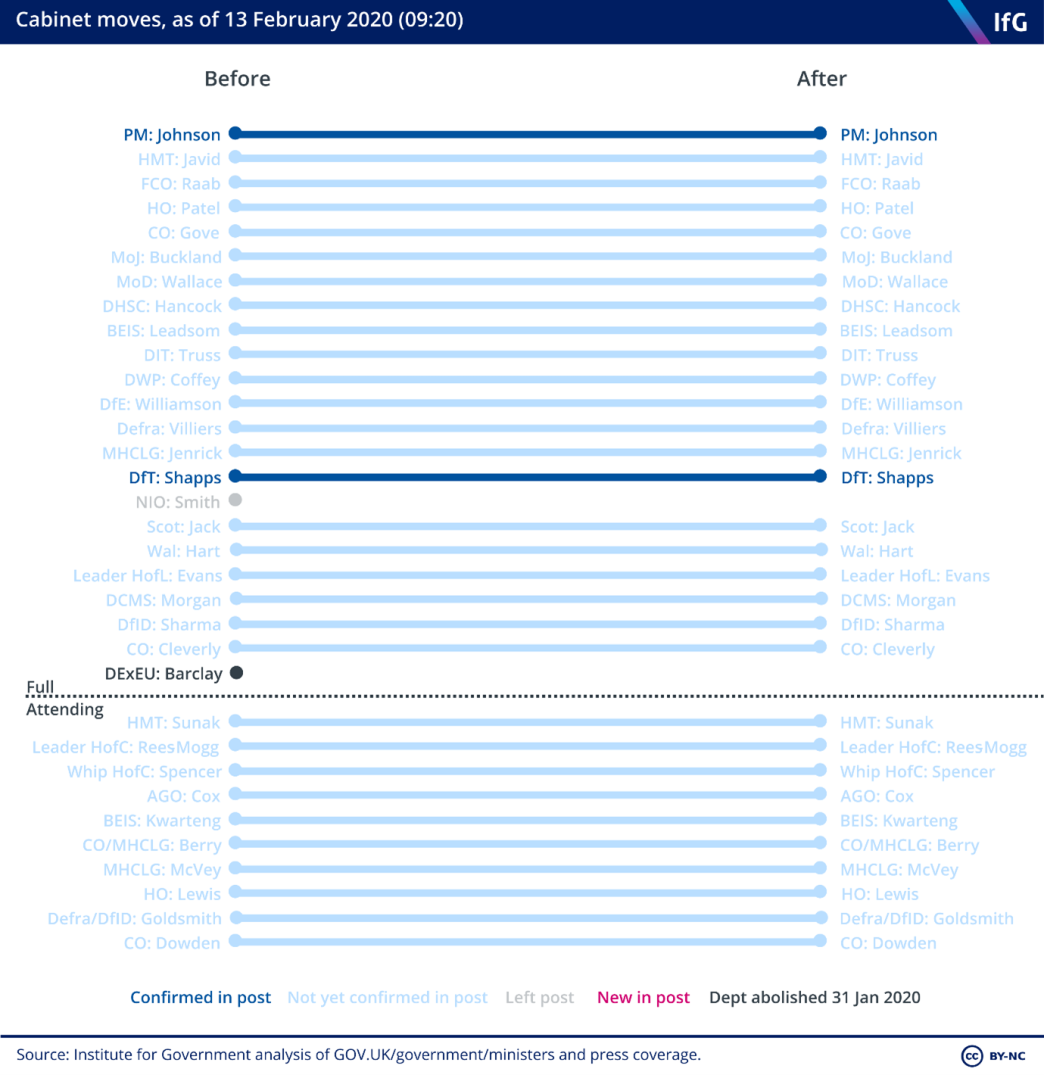
Jill warned against this a few weeks ago:
"Prime ministers have been too willing to use Northern Ireland as a convenient out-of-sight-and-out-of-mind post for someone they do not want in a bigger Cabinet role. As we have argued, the main consideration should be who is good for Northern Ireland. Julian Smith has rapidly established himself as a hugely more effective NI secretary than his Conservative predecessors. He has also shown he is willing to stick up for Northern Ireland in the Cabinet. Even so, he is rumoured to be on the hitlist for a reshuffle. The Northern Ireland Office (even though it just has acquired a new permanent secretary in Madeleine Alessandri) might even be rolled in to a new Department of the Union.
Both would be bad moves.
There are lots of things to keep an eye on today – who moves where, what happens to the gender balance of the government, and whether any departments will be created, abolished or otherwise changed.
We’ve got a handy guide on what to watch out for in this thread.
- Topic
- Ministers
- Keywords
- Government reshuffle
- Political party
- Conservative
- Position
- Prime minister
- Administration
- Johnson government
- Public figures
- Boris Johnson
- Publisher
- Institute for Government